#and depiction isn’t endorsement of course I know all that but also like ..
Text
Some would rebut that “Oppenheimer,” being a Hollywood blockbuster with serious global reach (whether it will play Japanese theaters remains uncertain), will be many audiences’ only exposure to the events in question and thus might “create a limit on public consciousness and concern,” as the poet, writer and professor Brandon Shimoda told The Times. A corollary of this argument: The crimes committed against the people of Hiroshima and Nagasaki were so unspeakable, so outsized in their impact, that Oppenheimer’s perspective does and should dwindle into insignificance by comparison. For Nolan to focus so exclusively on an American physicist’s story, some insist, ultimately diminishes history and humanity, even as it reinforces the Hollywood hegemony of the great-man biopic and of white men’s narratives in general.
I get those complaints. I also think they betray an inherent disrespect for the audience’s intelligence and curiosity, as well as a fundamental misunderstanding of how movies operate. It’s telling that few of these criticisms of perspective were leveled at “American Prometheus” when it was published in 2005, that no one begrudged Bird and Sherwin for offering a meticulously researched, morally ambivalent portrait of their subject’s life and consigning the destruction of two Japanese cities to a few pages. That’s because books are books, the argument goes, and movies are movies — and this perceived difference, it must be said, reveals a pernicious double standard.
Because they seldom achieve the narrative penetration and richness of detail of, say, a 700-page biography, movies, especially those about history, often are hailed as achievements of breadth over depth, emotion over intellect. They are assumed to be fundamentally shallow experiences, distillations of real life rather than sharply angled explorations of it, propelled by broad brushstrokes and easy expository shortcuts, and beholden to the audience’s presumably voracious appetite for thrilling, traumatizing spectacle. And because movies offer a visual immediacy and narrative immersion that books don’t, they are expected to be sweeping if not omniscient in their narrative scope, to reach for a comprehensive, even definitive vantage.
Movies that attempt something different, that recognize that less can indeed be more, are thus easily taken to task. “It’s so subjective!” and “It omits a crucial P.O.V.!” are assumed to be substantive criticisms rather than essentially value-neutral statements. We are sometimes told, in matters of art and storytelling, that depiction is not endorsement; we are not reminded nearly as often that omission is not erasure. But because viewers of course cannot be trusted to know any history or muster any empathy on their own — and if anything unites those who criticize “Oppenheimer” on representational grounds, it’s their reflexive assumption of the audience’s stupidity — anything that isn’t explicitly shown onscreen is denigrated as a dodge or an oversight, rather than a carefully considered decision.
A film like “Oppenheimer” offers a welcome challenge to these assumptions. Like nearly all Nolan’s movies, from “Memento” to “Dunkirk,” it’s a crafty exercise in radical subjectivity and narrative misdirection, in which the most significant subjects — lost memories, lost time, lost loves — often are invisible and all the more powerful for it. We can certainly imagine a version of “Oppenheimer” that tossed in a few startling but desultory minutes of Japanese destruction footage. Such a version might have flirted with kitsch, but it might well have satisfied the representational completists in the audience. It also would have reduced Hiroshima and Nagasaki to a piddling afterthought; Nolan treats them instead as a profound absence, an indictment by silence.
That’s true even in one of the movie’s most powerful and contested sequences. Not long after news of Hiroshima’s destruction arrives, Oppenheimer gives a would-be-triumphant speech to a euphoric Los Alamos crowd, only for his words to turn to dust in his mouth. For a moment, Nolan abandons realism altogether — but not, crucially, Oppenheimer’s perspective — to embrace a hallucinatory horror-movie expressionism. A piercing scream erupts in the crowd; a woman’s face crumples and flutters, like a paper mask about to disintegrate. The crowd is there and then suddenly, with much sonic rumbling, image blurring and an obliterating flash of white light, it is not.
For “Oppenheimer’s” detractors, this sequence constitutes its most grievous act of erasure: Even in the movie’s one evocation of nuclear disaster, the true victims have been obscured and whitewashed. The absence of Japanese faces and bodies in these visions is indeed striking. It’s also consistent with Nolan’s strict representational parameters, and it produces a tension, even a contradiction, that the movie wants us to recognize and wrestle with. Is Oppenheimer trying (and failing) to imagine the hundreds of thousands of Japanese civilians murdered by the weapon he devised? Or is he envisioning some hypothetical doomsday scenario still to come?
I think the answer is a blur of both, and also something more: In this moment, one of the movie’s most abstract, Nolan advances a longer view of his protagonist’s history and his future. Oppenheimer’s blindness to Japanese victims and survivors foreshadows his own stubborn inability to confront the consequences of his actions in years to come. He will speak out against nuclear weaponry, but he will never apologize for the atomic bombings of Japan — not even when he visits Tokyo and Osaka in 1960 and is questioned by a reporter about his perspective now. “I do not think coming to Japan changed my sense of anguish about my part in this whole piece of history,” he will respond. “Nor has it fully made me regret my responsibility for the technical success of the enterprise.”
Talk about compartmentalization. That episode, by the way, doesn’t find its way into “Oppenheimer,” which knows better than to offer itself up as the last word on anything. To the end, Nolan trusts us to seek out and think about history for ourselves. If we elect not to, that’s on us.
#WOE WALL OF TEXT BE UPON YE#I thought this piece was really good 😭#and I thought the Oppenheimer movie was pretty good 😭 embarrassing! oh well#reading#oppenheimer#I just think this writing in particular is making a lot of points generally about film viewing that I’m like yeah! YEAH!#all the ideas around respecting the audience’s reading capabilities like YEAH
495 notes
·
View notes
Text
Movies that attempt something different, that recognize that less can indeed be more, are thus easily taken to task. “It’s so subjective!” and “It omits a crucial P.O.V.!” are assumed to be substantive criticisms rather than essentially value-neutral statements. We are sometimes told, in matters of art and storytelling, that depiction is not endorsement; we are not reminded nearly as often that omission is not erasure. But because viewers of course cannot be trusted to know any history or muster any empathy on their own — and if anything unites those who criticize “Oppenheimer” on representational grounds, it’s their reflexive assumption of the audience’s stupidity — anything that isn’t explicitly shown onscreen is denigrated as a dodge or an oversight, rather than a carefully considered decision.
A film like “Oppenheimer” offers a welcome challenge to these assumptions. Like nearly all Nolan’s movies, from “Memento” to “Dunkirk,” it’s a crafty exercise in radical subjectivity and narrative misdirection, in which the most significant subjects — lost memories, lost time, lost loves — often are invisible and all the more powerful for it. We can certainly imagine a version of “Oppenheimer” that tossed in a few startling but desultory minutes of Japanese destruction footage. Such a version might have flirted with kitsch, but it might well have satisfied the representational completists in the audience. It also would have reduced Hiroshima and Nagasaki to a piddling afterthought; Nolan treats them instead as a profound absence, an indictment by silence.
That’s true even in one of the movie’s most powerful and contested sequences. Not long after news of Hiroshima’s destruction arrives, Oppenheimer gives a would-be-triumphant speech to a euphoric Los Alamos crowd, only for his words to turn to dust in his mouth. For a moment, Nolan abandons realism altogether — but not, crucially, Oppenheimer’s perspective — to embrace a hallucinatory horror-movie expressionism. A piercing scream erupts in the crowd; a woman’s face crumples and flutters, like a paper mask about to disintegrate. The crowd is there and then suddenly, with much sonic rumbling, image blurring and an obliterating flash of white light, it is not.
For “Oppenheimer’s” detractors, this sequence constitutes its most grievous act of erasure: Even in the movie’s one evocation of nuclear disaster, the true victims have been obscured and whitewashed. The absence of Japanese faces and bodies in these visions is indeed striking. It’s also consistent with Nolan’s strict representational parameters, and it produces a tension, even a contradiction, that the movie wants us to recognize and wrestle with. Is Oppenheimer trying (and failing) to imagine the hundreds of thousands of Japanese civilians murdered by the weapon he devised? Or is he envisioning some hypothetical doomsday scenario still to come?
I think the answer is a blur of both, and also something more: In this moment, one of the movie’s most abstract, Nolan advances a longer view of his protagonist’s history and his future. Oppenheimer’s blindness to Japanese victims and survivors foreshadows his own stubborn inability to confront the consequences of his actions in years to come. He will speak out against nuclear weaponry, but he will never apologize for the atomic bombings of Japan — not even when he visits Tokyo and Osaka in 1960 and is questioned by a reporter about his perspective now. “I do not think coming to Japan changed my sense of anguish about my part in this whole piece of history,” he will respond. “Nor has it fully made me regret my responsibility for the technical success of the enterprise.”
Talk about compartmentalization. That episode, by the way, doesn’t find its way into “Oppenheimer,” which knows better than to offer itself up as the last word on anything. To the end, Nolan trusts us to seek out and think about history for ourselves. If we elect not to, that’s on us.
#what I'm reading#oppenheimer#nuclear power#inject this entire essay into my veins#part of what makes oppenheimer such a powerful movie is how closely it hews to its subject matter#except for the hearing plotline we see what he sees. we feel what he feels#the people who were building the bombs never saw its effects. they lived in a tiny town deliberately cut off from the rest of the world#and when their labors bore fruit they heard about it on the radio like everyone else in the country#oppenheimer included. inventing something doesn't give you special power into what it actually looks like when it's used. that's the danger#the idea that oppenheimer would have been better or more respectful if there had been some random cut to people in japan or the new mexico#desert being bombed frankly strikes me as incredibly gauche#and the idea that this movie needs to encompass every aspect of the bombings because it would be unrealistic or unfair to expect people#to seek out any additional knowledge that can't be found in a blockbuster movie is just so insulting to our collective intelligence
68 notes
·
View notes
Note
I don’t know if this is valid as it’s not an adventure request, but DMs were closed so it wasn’t possible to check in advance.
What is your position on campaigns/adventures that are very direct parallels to colonialism? Somewhat broad question but I’m curious where you stand on the subject, especially since opposing ‘foreign explorers use violence to extract wealth from less developed peoples’ is about as mainstream as D&D gets.
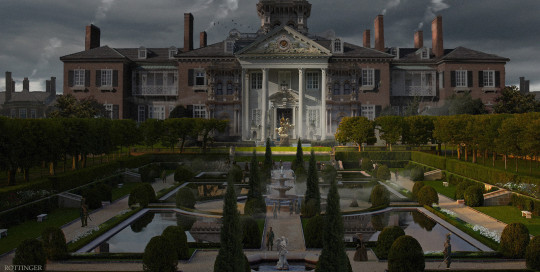
ALT
ALT
Heavy Topics: Colonialism
I find this question so interesting because for a long long time d&d was a game that was (at least tangentially) very pro-colonialism what with the scientific racism built into the lore about how the lesser monstrous races should be culled, curtailed, or corrected. People thinking that Anticolonialism is a hallmark of the game means that somewhere along the way there’s been some kind of seachange, either in the playerbase or the greater culture and it’s happened over the course of my fairly short d&d playing lifespan.
I’m going to go into lots of detail on this below the cut, but TLDR: While D&D has never specifically endorsed colonialism, the game used to have driving factors that were direct holdovers from the imperialist tradition: a dynamic of inherent superiority for those peoples deemed “good” Just like in our own history, these drives were seen as heroic but seem to have rapidly fallen out of fashion leaving an uncomfortable gap at the heart of the hobby.
As for adventures that involve colonialism, they’re fine, just do your research and make sure you’re not glorifying or tacitly endorsing genocide. A lot of great stories can be told against the backdrop of mass exploitation, just be extra cautious if you’re going to try and directly reference/evoke something that happened in our own world.
First, Lets talk about supremacy: In the earliest days of d&d, the world was divided into two sides, law and chaos, with law taking on everything that could be considered good and nurturing, and chaos taking on all that was wicked and destructive. It was this meme, but literal:
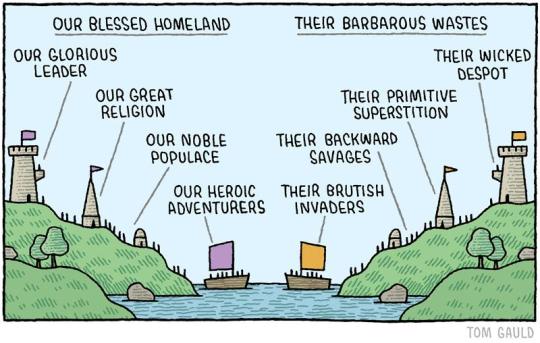
ALT
I don’t think I need to tell anyone this, but that sort of ideology is the worldview of an oppressor, one who thinks their own nation/religion/ethnicity is right and chosen and all others are inferior. It’s also the same sort of cartoonish black/white morality you see in today’s fundamentalists: my enemies can’t just be wrong, they have to be doing the most evil things I can imagine ranging from being authoritarians to practicing human sacrifice and being in league with the literal devil. That’s why the argument “(depiction of monster fantasy race X) isn’t racist, (X) are literally embodied evil and thus its ok to kill them” should never hold any water because it’s the exact same narrative that’s been trotted out over and over to justify IRL genocides on various scales.
The old monster manuals used to go out of their way to talk about how various species of monstrous humanoids ( which is totally not a synonym for “lesser races btw) spoil their environment just from living within it, that they make nothing of real value, no art no tools, and what weapons they have are either crude constructs or stolen from their betters. The obvious connection here is that the players should feel no qualms about walking into their lands and putting them to the sword so that “real” people can make use of those lands, or at least to stop their encroachment on the party’s own territory. And here we get to the root of the issue: in trying to create a world in which it is ALWAYS right for our heroes to slaughter their way through hundreds of enemies, the evolving mythology of d&d over nearly 50 years adopted the exact same talking points used by the villains of our world whenever they felt like they had slaughter their way through hundreds of other human beings to get what they wanted. As one of those people who others would slaughter in the pursuit of a “pure” world, I have a big problem with that.
Surprisingly, grey morality leads to way less implicit hate crimes: If two cultures are going to war it’s not because one side is evil and the other is good, It’s because that’s what people in a resource-scarce environments have always done, especially when they were desperate or their leaders saw a chance to acquire more power. I can look at the reign of one history’s greatest warlords: Genghis Khan and say “I think him executing whole cities and making pyramids out of their skulls was an atrocity” without thinking the people of the Mongolian steppe have and always will be servants of the dark lord Baphomet, demon prince of slaughter. If we abandon the justifications built into the game to make killing always a good thing, what we end up with is a diverse gaggle of fantasy species that can be played off against one another when building a setting. Sure, some of these groups may HATE eachother and even commit unforgivable acts against one another, but by removing the lore based condemnations of one group we end up creating a world where that hate and those unforgivable acts aren’t implicitly justified.
Art
#dnd#dungeons and dragons#adventure#5e homebrew#homebrew adventure#heavy topics#racism#colonization#writing#writing advice#DM advice#dm tips#dm tip
250 notes
·
View notes
Text
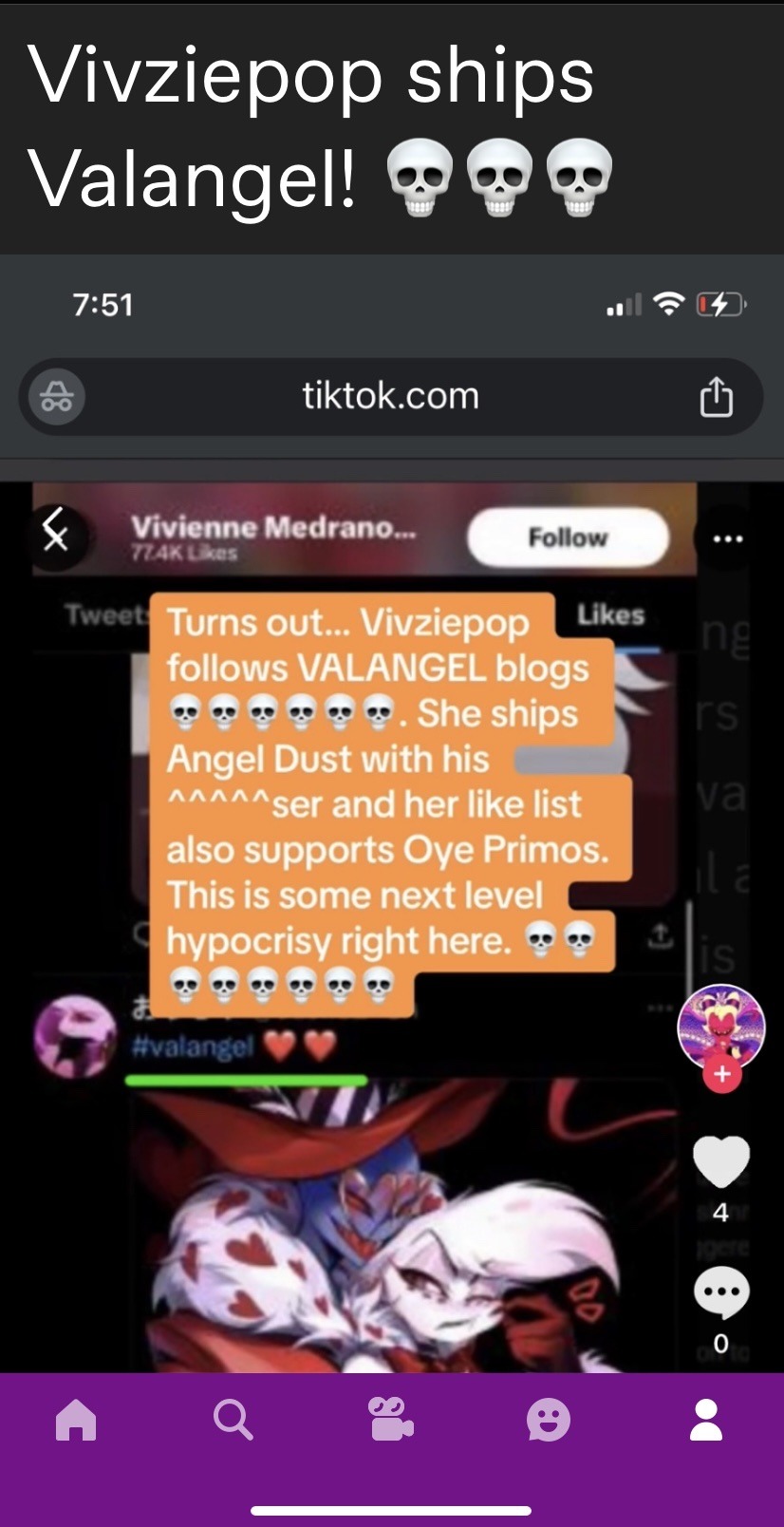
Do you think idiots like this understand you can like ship art without like…endorsing actual real life abuse?
Oh wait, they’re an anti, of course they can’t differentiate between fiction and reality.
Someone liking Valangel art (I imagine for the angst potential than actually thinking they’d be good together) doesn’t fucking mean they condone actual abuse.
And yeah, Viv did put in that one scene in the Addict MV where it implied Angel got SA’d but depiction doesn’t equal endorsement.
I know this bitch is literally too fucking baby brained to actually think about shit beyond their surface-level analysis but for gods sake.

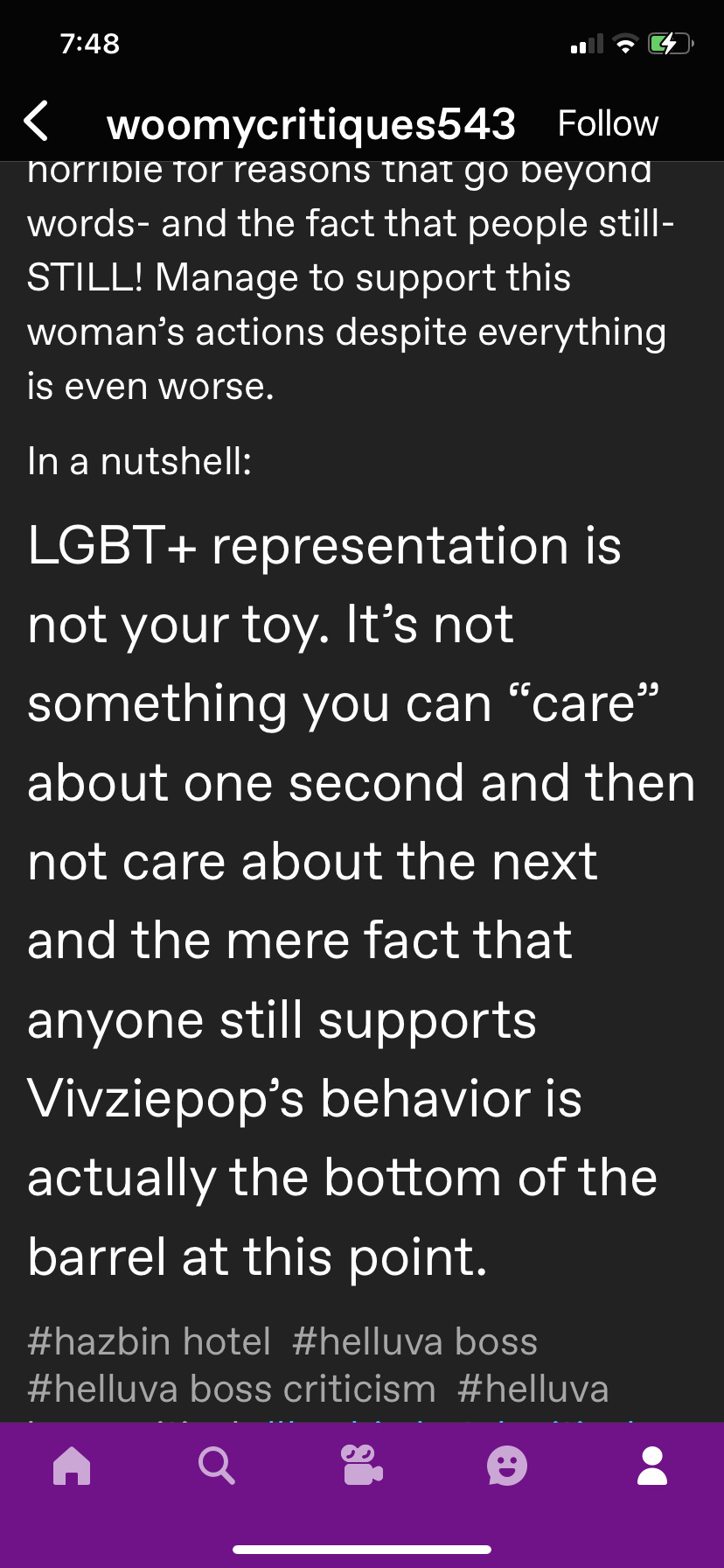
Also if you are fucking incapable of writing words like abuse, rape, fetishize, whatever fucking words you meant to put down, you are obviously just as fucking incapable of analyzing such topics, and you probably shouldn’t even be watching either of Viv’s shows if you’re that immature.
This isn’t fucking TikTok.
Grow. The fuck. Up.
The fact you’re still wasting your time bitching about Viv as if your frankly delusional opinions actually have any meaning outside of your clearly fucked up little head certainly says something about you, mainly that you need some kind of mental help.
And here I thought you “gave up?” Can’t say I’m surprised. Idiots like this are incapable of giving up on anything.
Always finding something to bitch about Viv because they’re so fucking convinced she’s fucking Satan incarnate and they’re the hero, saving the world from the horrors of Viv’s influence like she’s a fucking plague upon mankind or some shit. And they’ll find any excuse to treat her as such, no matter how minor. Delusional. Unironically.
Hmm…put it like that and they almost sound like a fucking evangelical Christian.
Constantly looking at Viv in bad faith 100% of the time is fucking ridiculous. They act like she’s so malicious about every little thing she does online.
She can’t fucking donate money cuz she’s doing it for the clout, she can’t like ship art on Twitter cuz that means she endorses abusive relationships. Viv responding to criticism in a way they don’t like means she can’t take any kind of criticism at all and if she doesn’t respond to their dogshit opinions at all then that’s bad too.
Seriously waaaayyy too many of these fuckers act like this and it’s pathetic. I can’t take these bitches seriously.
If you want to fucking help survivors of SA or whatever there’s shit you can do to actually help people, charities you can donate to, whatever, bitching about this in the way you do doesn’t fucking do anything but make you look deranged.
Get a fucking life sfigato, you aren’t helping anyone, much less yourself.
You’re fucking annoying as sin but so un-fucking-self-aware about it, it’s almost pitiful.
God we really have a mental illness problem in this godforsaken country, Satan help us. Cuz we all know the Lord isn’t doing shit.
🧨🔥~Firecracker out~🔥🧨

5 notes
·
View notes
Text
It is my professional goal to write something so good à la zelda fitzgerald’s “I wish I could write a beautiful book to break those hearts that are soon to cease to exist: a book of faith and small neat worlds and of people who live by the philosophies of popular songs” and garner enough of a following that my spiritual uncles the Green brothers ask me to be involved with the p4a and I can offer copies of my secret horrific heterosexual fanfiction.net work as donation perks— like I went and made sure I had them saved on a Google doc somewhere because of the ever-present threat that the website will obliterate as so many have before it, and just the quick glances I took at what I had written ,, 🙅🏻♀️ only for the sake of charity could eyes other than mine take that in alskdks
#me talking#they’re so bad you guys 😭#it’s not just how terribly straight they are but also like .. I did not have a concept of healthy relationships back then Clearly#and depiction isn’t endorsement of course I know all that but also like ..#I would never write shit like that now#let’s leave it at that lmao
4 notes
·
View notes
Text
Ok ok ok – Bad Buddy Ep 3, Part 1/4, and I am LOSING MY MIND. Some really interesting stuff in this one, only it’s things that aren’t thrown into sharp relief until you’ve seen later eps, so this one really rewards re-watching.
Of course, that definitely means due diligence: This will absolutely contain spoilers for later episodes, if not through the end of the show. If you haven’t seen the show yet and want to watch it unspoiled, drive on by for now and come back when you’ve finished watching.
SO. We OPEN ON … No, wait. First, we have our disclaimer, telling us not to try this at home, kids, because depiction is not endorsement, so I guess maybe we’re going to be double-fisting at the bar again at some point? There’s a Previously On: Pat and Pran discover their living situation hasn’t changed at ALL, despite being in the dorm; Wai gets harassed on the job by a bunch of drunk assholes Pat and the Engineering secondary backup hobbits a bunch of drunk assholes; flashback to the root of Pran’s worst nightmare of getting caught with Pat; and Korn and Wai punch the shit out of each other and the bus stop under the unflinching eye of a security camera, so that’s going to go GREAT for everyone.
OPEN ON … OK, no. I have to pause again, because our timeline is a little fucky here. At the end of Ep 2, we cut from Pat and Pran arguing about who’s moving out directly to the bus-stop fight. Then we open Ep 3, and one would presume this is the next morning, after both the moving-out argument and the bus-stop fight, but one would be INCORRECT. It is maybe the morning after the moving-out argument, but the bus-stop fight hasn’t happened yet (we find this out later), which is why, when Wai sidles up behind Pran in the Architecture workspace, Pran is the one who looks like he went 10 rounds the night before, while Wai doesn’t seem any the worse for wear.
SO, OPEN ON: Pran doodling in his sketchbook, and I’m presuming the little dude he’s scribbling, with the angry eyebrows (fierce eyes?) is supposed to be Pat. He could use a little bit more hair, if you’re taking constructive criticism, Pran. Also, what’s next, hearts in the margins? You have it bad, my dude, and I bet you could not be more irritated by that fact. Wai sidles up behind him to take a peek, and then there’s some discussion about how hard songwriting is, because I guess Pran is supposed to be using study-hall time to write their song for the competition? Pran namedrops Fongbeer Pativate, and Wai namedrops Pat Klear, and then Wai gives Pran some advice to stop using his head because sometimes you have to use your heart and bring out your inner feelings, which is advice that Pran probably needs tattooed on his forehead at this point of the show, so he can see it every single time he looks in the mirror. We know this is true and good advice because Pran looks like Wai is telling him to eat a raw slug, not just talk about his feelings, and I know, my dude, I feel you on this, because you remind me a little too much of me, and I have also been subjected to this conversation. More than once. Pran insists that his life isn’t interesting enough for a song, and Wai … Wai grabs one of Pran’s pencils and sits down with a piece of paper and asks him if he’s ever had a secret crush on anyone before, and this is where I have to pause this episode and scan forward through the later eps, because I’ve seen this scene before, where have I seen this scene? OH, RIGHT. This is the flashback scene from Ep 5 when high-school Pran is explaining to high-school Pat how to write a song, and he’s asking Pat if HE’S EVER HAD A SECRET CRUSH ON SOMEONE, and he’s TAKING NOTES ON FEELINGS while DRAWING OUT PAT’S RESPONSES, and now I’M LOSING MY MIND. They’ve literally taken high-school Pran’s words and put them in Wai’s mouth in a pair of scenes that explicitly mirror each other, and there’s a couple of things going on. No. 1, I’m becoming convinced that one of Wai’s functions in the narrative is to represent a part of Pran that does what Pran wants to do but is too afraid/repressed to actually do. This is as small as the fact that Pran no longer writes songs or plays the guitar but Wai convinces him to participate in the band competition, and as large as the fact that Pran lies to Wai like Pran lies to himself about his feelings/relationship with Pat. Wai gets super pissed off about the lies and lashes out the way Pran gets angry about growing up in an entire web of lies and deceit – including his own subterfuge that’s the only way he can manage to be friends with Pat – but that we don’t see come out as anger until he confronts Dissaya (and then runs away from home to be a pirate fisherman) in Ep 10. Wai drops that curtain and exposes the relationship between Pat and Pran after Pran has just finished fighting with Pat about how Pat is going to expose them with the way he keeps posting suspicious stuff on his IG, but god, ok, fine, Pat doesn’t have to stop doing it, it’s alright, and Wai has made his peace with the relationship between Pat and Pran by the time he escorts Pat to the bottom of the staircase to allow him to make his proclamation of love out in the open in front of the entire Architecture faculty. ALSO. No. 2, Wai is giving Pran a do-over. This is Pran’s permission – whether he still needs it from an outside source, or Wai is again functioning as part of Pran’s own psychological make-up here – to pursue this thing with Pat, if he decides he wants it. Wai has been the human-to-Pran interpreter in terms of relationship stuff previously, and he handed out what was – let’s be honest – the most mature, reasonable advice re: interpersonal interaction that we’ve heard from anyone on this show so far, and I’m including the adults. And now, here he is, sitting in the exact position that high-school Pran sat in, advising Pran to do exactly what he did when he was younger, what Pran ended up being punished for, what Pran repressed and lost. Wai is validating Pran’s high-school emotional/relationship experiences re: Pat – he’s showing Pran that what he felt and experienced and talked to Pat about back in high school wasn’t wrong, that it was normal and something to be celebrated, something to be commemorated in song, that Pran’s high-school instincts to do that were correct, that it wasn’t something to be ashamed of the way his mom made him feel, that Pran should trust those feelings, that they’re important.
I AM LOSING MY MIND, y’all. And people want to talk about how Pran and Wai were never really that close, or how their relationship was never really developed? Also, yes, I see what you did with the queerness metaphor there, P’Aof.
Anyway, what’s happening plot-wise is that we get a shot of Pran looking wide-eyed at Wai, then a flashback to the high-school music room, where Pran is trying to play his guitar but hurting his fingers. When Pat wanders in, Pran’s kind of shifty, but Pat is immediately like, what’s the matter? Which is interesting – was Pat actually that immediately attentive, or is that how Pran remembers him? Do we get any unreliable narrator stuff in these flashbacks, or should we take them as given? Anyway anyway, Pran says he forgot his guitar pick and when he refuses to let Pat cut up his student ID to make a pick, Pat cuts up his own student ID and presents Pran with a guitar pick that now has Pat’s FACE on it and is going to hang over the mantel like an unused gun for the next nine episodes. I’m serious, I kept wondering when this pick was going to make another appearance, and it turns out to be a blink-and-you’ll-miss-it in 20 seconds in the last four minutes of the show, which is kind of disappointing. Nevertheless, high-school Pran picks up the pick and studies it, and he can’t help smiling, and high-school Pat looks back at over his shoulder to watch him, also smiling, and I want to throttle both sets of parents for the opportunities these kids lost, growing up. (Although, also, there’s a little gremlin part of me that now wants to read the AU where they were allowed to grow up as friends and now, they actually can’t stand each other, because familiarity breeds contempt. Ha.) Pat tells Pran to stop looking at it and play, and as Pran starts playing the guitar (with Pat’s FACE), we get Wai’s voiceover pulling us back to present-day, telling Pran that when you fall for someone, your heart flutters, because apparently, just like Pa, Wai’s got a set of tells that he uses to gauge attraction. It also includes that when you think about them you can’t help smiling, and at this point present-day Pran looks up, kind of soft and starry-eyed, completely giving away just how fucking gone he is over SOMEBODY, before he makes a face at Wai and insists that wasn’t a smile, then shoves his stuff in his bag and leaves in a rush that is not suspicious at all, no way, nuh-huh, as Wai is clearly amused by him.
Insert opening credits. Yeah, we’re only like seven minutes in, and all this has happened already. I don’t know if I can take 3.5 more parts of this. I might die.
Cut to night, Pran ordering food at the noodle truck – three wontons, we come in on – and then he wanders over to a table and asks a random dude in a Tim Horton’s T-shirt if he’ll share his table, and the guy turns around and surprise! Is Pat. We learn that Pran’s order is specifically Red Pork Noodle Soup With Three Wontons And No Garlic, as the server delivers the bowl to this table, so there’s no backing out, now. Pran sits down, grimacing. Pat is amused. Pran is looking around like he’s expecting to be under surveillance (hypervigilance! always a fun time!), and Pat tells him to just eat, that no one’s going to see them (they’re not going to get caught). Pran tells Pat to finish chewing before talking, and I’m immediately flung back to the Cloud Recesses. If Pran could make “No talking while eating” a rule, he probably would. (If Pran could institute all 3000 of Gusu Lan’s rules, at this point, he probably would. I … kind of want some kind of crossover fic where Lan Qiren and Dissaya get stuck in a small room with each other, now. NOBODY would stand a chance against their combined Them-ness, not even Wen Ruohan.) Pat wants to know, why three wontons, and Pran’s face is super unimpressed by this small talk, but he does offer the explanation that two isn’t enough and four is too many. Pran measures his chopsticks, and Pat gives him a look before raising his bowl to tug on Pran’s pigtails slurp up some of his own soup. There’s more bickering, and Pran’s still irritated, and Pat’s still amused, and this all culminates in Pat stealing one of Pran’s wontons, putting it in his mouth, then letting it fall out of his mouth back into his own bowl and challenging Pran to take it back. Pran, instead of jamming his chopsticks into Pat’s eye like he has every right to do after that little stunt, actually does make a break for the wonton in the bowl. Pat counters, and they have a chopstick fight before Pat cheats by using his other hand to pull Pran’s chopsticks out of the way, and he finally slurps down the wonton. Pran is SO DONE with this childish behavior, and he’s also done with the way Pat continues to just sit there and stare at him eating, but his attempts to make Pat go the fuck away not only don’t work, but Pat pays for both their dinners. Does that make this a date? What is the protocol here? Pran begrudgingly thanks Pat, and then there’s this split-second when Pat’s face does A Thing while Pran’s looking down into his bowl and can’t see him, something softer and less confrontational, maybe a little bit contemplative, before he’s back to being an ass again.
Back at the dorm, they discover the elevators are out of service, and Pat doesn’t know how to deal with whatever feelings this wonton battle has awakened in him other than to challenge Pran to a race up the stairs, because OF COURSE competition is the only way he knows to interact with Pran, and he clearly doesn’t want tonight’s interaction to end yet. Bro, you need to get there faster, alright, and I don’t mean up the stairs. Pran’s a delightful little fucking cheater who acts like he’s not interested right up until the second he takes off without warning, and then after he loses, insists that he never really accepted the challenge in the first place. In between, there is a lot of horseplay and flinging each other around as they take advantage of this intricately constructed ritual to touch each other. Afterward, they both hang on their respective doorjambs, panting, and we get some more product placement that continues to be not as charming as Wolong’s Famous Nuts, but then, what is? There’s another scuffle that allows Pat to kind of slam Pran up against a door before Pran elbows him away. When they finally break, Pat tells Pran that if he wants a rematch to come knock on his door any time, but if Pran misses him … don’t knock, just come in. You would think he’d never met Pran, if he thinks Pran is going to blink at gay chicken. Pran holds out a fist to bump, but then gives Pat the finger at the last minute (which, for those of us keeping score, like me, let me just point out was the thing that Wai did that all of Engineering was so exercised about that they decided he deserved a seven-on-one beatdown). Pat gives him the finger back before they both retreat into their respective rooms. How very Your Dads of you both. Safely inside his room, Pran leans against the door, and it’s a good thing Wai’s not around, my dude, because he would ABSOLUTELY call you on that smile on your face. Also, yes, Pat was playing gay chicken with you, but don’t assume he’s smart enough to realize what he was doing. I’m just sayin’. Anyway, Pran kind of shakes his head ruefully as he moves off-camera, and we’re left looking at the big smiley face poster taped to the inside of his door. This is probably supposed to tell us something about his mood right now, but what it actually does is make me sad as I realize that he’s got the big lighted frowny face over by his computer, in his inner sanctum where it’s safe to express those feelings, but he’s got the big smiley face taped up where it’s the last thing he sees before he leaves his safe haven to go out into the world every day, reminding him of how he should project himself to the world. UGH. My HEART.
Cut to Pat in his own room, when there’s a knock on the door. He clearly expects it to be Pran, but it’s Korn and the other Engineering secondary backup hobbits, and THIS is apparently when the bus-stop fight happened, because they’ve had the shit kicked out of them. Hmm. Looks like maybe someone’s mouth was writing checks their body can’t cash. Inside the room, Korn says that they tried to hold back, like Pat suggested, but Architecture started it. So, here’s MY question, bro: Do I believe you or not? I’m not sure I do, given your track record, but also, what do you consider “starting” it? Because it’s a common bully tactic to verbally torment someone until they throw the first punch, and then accuse them of “starting” it, and I’ve seen the way you instigate. Mo insists that they didn’t start it this time, and he sounds so sad, like he can’t believe someone would beat them up rather than the other way around. Poor fucking baby. Anyway, cut to the next day, with Pat and the other three standing around nervously outside an office as an admin meeting goes on. Pat tells them to prepare for what’s coming, Korn tells him not to rub it in, and I roll my eyes, because frankly, you need your nose rubbed in it, from what I’ve seen. Pat’s worried that he’ll be banned from the music competition (and then how will he compete with Pran?!?!), and Korn’s response is probably the first thing he’s said so far in the show that I agree with.
Cut to Architecture, with the seniors asking the Arch secondary backup hobbits how they are. They don’t look great, either, although I think it’s a little hyperbolic when someone tells them they look TERRIBLE. An instructor shows up and kicks out anyone not involved with the incident. Pran stays, even though he wasn’t there for the fight. They’ve avoided academic probation, but they have to rebuild the bus stop. Wai protests that Engineering were the ones messing with them in the first place. The instructor tells them it’s because they started it, and I literally throw up my hands again, because yes, that actually is the unfortunate response too many times when someone finally takes a swing at the bully who’s been harassing them and gets hauled off to the principal’s office. ANYWAY, they look at the projected expenses, and everyone is dismayed. They have to have it done by the end of the month. Pran thinks he can get some materials discounted from his parents. Wai is super irritated by all this and kicks a chair and basically calls it all bullshit and tells Pran that he shouldn’t have to be involved; he adds that Engineering should have to take responsibility, too. Pran gets his thinky face on and blatantly, deliberately ignores a phone call from Pat. Cut to a scene where Pran does go talk to Pa about some materials from her family’s business that are out of stock at his family’s business, and she promises to give him a discount. She asks if he needs them for his faculty event, and Pran gets this weird soft look on his face like he’s going to cry at any minute, and Pat, you are in for it now. Laundry privileges are ‘bouta get REVOKED.
Cut to Pat in his room at home, still trying to get Pran to respond to his calls. He’s watching through their bedroom windows into Pran’s room as Pran checks his phone, and NOPE, not answering that call, either. Pa comes in reminding Pat that he promised to leave Pran alone. Pat protests that he had nothing to do with it, blames it on Korn, and asks how Pa knows about it, anyway. I find this … a contrast to Pran’s insistence on remaining at the table (lit. and fig.) with Wai, Louis and Safe for their punishment. It is … a contrast that makes Pran look better than Pat, I’m just going to say. Pat insists Architecture started the fight, and anyway, the punishment was decided by the university board, not him. Pa, much like Pran, is DONE at this point. Laundry privileges are revoked. After she leaves, Pat goes to a drawer and pulls out one of those contraptions where kids make a telephone out of two tin cans and a string. He’s kept it in a drawer all this time because both of these morose motherfuckers are hopeless. Anyway, he tosses one of the tin cans over through Pran’s open window, because he figures this way, Pran has to answer. Pran is clearly pissed off but puts the can to his ear. Pat tells him not to be unreasonable, and Pran’s a better person than I am, because I’d drop that can and come over that windowsill at you if you condescended to me like that, at this point, bro. Pran is understandably incredulous (IKR, baby?). Pat goes on about how Pran’s friends started the fight, and it wasn’t his friends’ fault. Pran tells him that if Pat’s friends hadn’t put that video online, Pran’s friends wouldn’t have lost their heads. Pat looks puzzled and wants to know what video, at which point I throw my hands up again and literally exclaim “Oh, FUCK you,” at the screen, because the video you’ve been wanting to get since Ep 1 as revenge for someone uploading the initial video of Wai flipping you off, Pat. You remember that? The video that you insisted you needed of Wai having the shit kicked out of him, to salve your manly pride? Pran is almost as pissed as I am, which is viscerally gratifying to watch, and he tells Pat that it was the video of Pat’s friends in the bar, picking on Wai, that they posted online (like you planned in Ep 1, Pat). And now Pat has the temerity to look all puzzled and say that he didn’t know about the video, which is big news to Pran, because as he points out, Pat’s is literally in the video. “You looked so happy,” Pran tells him, then throws his tin can onto the ground before shutting his window and turning his back on Pat. Mmmm. Tasty, tasty catharsis. Pat continues to act baffled, I don’t feel sorry for him, and scene.
Next on PART 2: Pat’s trying to be a good boy, and maybe I’ll have a little more sympathy, but Pran continues to be SO. DONE.
#pran parakul#pat napat#a metric fuckton of family dysfunction#even more college friends dysfunction#wai#the human-to-pran translator#korn#a trashfire gremlin and his windbreaker(s)#various other characters with questionable coping methods#i.e. everyone on the show#pran & wai#pat x pran#korn's wai fixation#and#pa#who is precious and perfect#and has done nothing wrong ever in her life#fight me#bad buddy#bad buddy episode reax
16 notes
·
View notes
Text
Disney Prince!AU with Seonghwa
★ Seonghwa as Disney’s Prince Charming ★
moodboard link
Group: ATEEZ
Member: Park Seonghwa
Genre: fluff, romance, hints of angst
part of the Disney Prince Series - could also be a prince!au
Type: Bulletpoint AU
Word Count: approx. 3k
A/N: I had to spice things up a bit bc after a rewatch of Cinderella, I have realized they have no flavor and got a bit carried away—so enjoy!
Warnings: family death + mentions of abusive family - you know the classic princess storyline.
Seonghwa….. is not your average prince
but it’s not depicted in a negative light
so, he’s the prince other nations wished they had
he’s very involved with the state of affairs, often spends time in the villages and conversing with the townsfolk, and often visits schools to read to them or just watch them and it’s so……...wholesome
*cut to him struggling to sit on the carpet with the kids bc his legs can’t fold*
basically everyone loves him because he’s got this angelic aura around him that just makes you feel like you can trust him with anything
and I mean anything
mothers would probably offer him their babies if that was appropriate
he’s just super sweet and tries to remember what he learns in order to take it back and make use of it with the current policies that the parliament is trying to endorse or something
obviously, this is the main image of him to the public
and it’s not fake
but those in the palace know he can get a bit mischievous and sassy
it’s only really seen by those who are close with him, or have been around for a longer time
like assistant!Hongjoong and head butler!Wooyoung
since they’re all close in age and grew up together too, they’re much more comfortable with one another
Hongjoong: *hits his head on a doorway*
Seonghwa: “......... are you an idiot?”
guard!Yeosang and butler-in-training!San: laughing
no, but for real, all of them know he’s basically an angel
the amount of shit he’s putting up with them, but like they make for great entertainment lmao
anyways
the older workers at the palace find him adorable
like when Seonghwa tried to sneak-eat the freshly picked strawberries
“my prince, did you just eat a strawberry?”
Seonghwa with a mouthful of them: “no”
he’s like the grandson they all want (and are trying to get, but we’ll get to that later)
other than his charities and visits and public outings, he’s also known to be a good horseback rider
like real good
Wooyoung: “this is the most princely we’ll ever see him”
he’s kidding, but he’s also not kidding
bc lbr: Seonghwa in a horseback riding fit with the shoulder pads and the helmet and the wind and
Wow
many gather to see him in his glorious, sweaty state afterwards
it’s funny bc he’s so handsome and there are times when he’ll acknowledge it and other times when he doesn’t
especially since the ateez boys just ignore him or tease him
now it just depends on how he feels that day as to how he’d react
since he’s got such a good reputation, you know what that means?
lots of treaties and lots of marriage proposals
on one hand, many nearby countries know how nice Prince Seonghwa is—and some thought he was naive enough to be deceived by them
and that led to a few wars, but they lost real bad bc they assumed he was too nice
when, in actuality, he’s very knowledgeable since he takes a lot after the king and the queen
that allowed much more respect for the kingdom, especially since he’s the first in line for the throne once he’s married
which leads to the second thing: he gets lots and lots of marriage proposals
have you SEEN him?????
do you know how CAPABLE he is????
helloo?????
anyways
the royal family kind of milks this—not in that way tho
it’s in the sense that it’s because they want him to find someone soon and there’s more time for them to learn the ropes about ruling a kingdom
that means lots of balls are thrown in hopes of Seonghwa finding someone to ~catch his eye~ and whatnot
but Seonghwa just uses this as a diplomatic advantage, you know? like a chance for him to meet other royals and build these relationships
and while he has good intentions, the rejected royals are kind of bitter, but they know better than to mess with the Royal Family
meanwhile, party planner!Yunho is lowkey racking in the dough from these events, so he’s fine throwing all these balls lmao
this is where you come in
but, it’s not how others might think
so, you used to be the daughter of a well-of-ish family—you had money for a house and caretakers who adored you and you with parents who loved you dearly
you lived in your own little bubble of love
but then your mother died
when she died, it was almost as if she had taken the lively atmosphere of the household with her
your father buried himself into his work, rarely making time for you anymore and…. there was a drift
one day he came home with a mysterious woman, proclaiming her as your stepmother
along with her came her two daughters, who were as ugly outside as they were on the inside
while you could have done without her passive-aggressiveness, it was nice to see your father happy
but lo-and-behold, you lucked out and he died on a business trip, leaving you alone with strangers to become your only family
it only got worse from there as they openly started to mock you, shame you and push you beyond your boundaries
as they could no longer pay for the staff, they also forced you to clean after them, cook for them, and make all the arrangements that they demanded
or, as your oh-so-lovely stepmother said “you’re below us and you will always be below us”
at first, you put up with it because there’s nowhere else for you
but, slowly, the idea of running away was starting to sound better
and the opportunity came as the palace was starting to look for more servants who would stay in the servants’ quarters
you immediately packed away your things, which wasn’t much to begin with—your mother’s locket being the major trinket you possessed
and ran off to work as a housekeeper, who hid away behind the palace walls and the public eye
since you clean for the palace, it also means cleaning after the balls
other than television appearances, you never really saw the royal family
even as you did work in the palace because……………. they’re running a goddamned country
but, of course, there are rumors and gossip with the other housekeepers which all come from reliable resources
**cough cough definitely Wooyoung cough cough**
so there’s a lot of what you heard, not really from what you’ve seen, despite what some might think when working in the palace
that was until you were called to work at your first ball
which meant you were cleaning after the tables and in the kitchens, going in and out of the ballroom and between dinner tables
getting glimpses of some of the royals
and picking up on some of their juicy conversations
(apparently this one duke almost had an affair with this king’s secret mistress… all the tea)
anyways
you get the point
every once in a while you have to work at the balls when they need the extra help
but, there was one that was…………. different
a lot of the balls are for the royals to take and engage and whatever, but there have been so many and Seonghwa………….
Seonghwa hasn’t been interested in a single one despite the purpose being to help him find someone
Hongjoong: “what’s wrong with them?”
Seonghwa: “there’s nothing wrong with them, I don’t want just someone”
Seonghwa: “I want it to happen naturally—call me old fashioned but if this is someone I want to spend the rest of my life with, it has to be someone who knows me”
Wooyoung, in the corner: “that is old fashioned, hasn’t he heard of tinder?”
advisor!Mingi: “I don’t think it would be a good look for the country if the prince is on tinder”
guard!Yeosang: “we should test it out”
butler-in-training!San: “omg reverse pretty woman”
Hongjoong: “everyone get out, you’re all useless”
okay, but like real talk: he’s such a romantic and the whole unofficial arranged marriage is just………. too much
so, his parents were like: so, you want more options?
Seonghwa: “not what I said”
and they expanded the invitation list for one night, meaning ANYONE had a shot with Seonghwa and
well
he is very popular, so you can imagine how many people were planning on coming and the staff (i.e. you) had to prepare for everything
for the week, the castle was bustling and you were running around to help out and it……. it was all so insane
and then it happens
you’re minding your own business and working and eavesdropping as one does when one works
because everyone is there and who doesn’t love listening to drama that isn’t just from fancy people
but since everyone is here
you failed to remember that a certain group of people were also there
the group of people being your step-mother and step sisters
instinctively, you ducked and hid, moving away from the main room that was swarmed with people who were all trying to obtain Seonghwa’s attention
(who was also trying to hide from everyone else and instinctively failing)
eventually, you found yourself in the gardens, where you tried to make yourself busy
but it ended up being a small walk through the gardens, picking up the occasional liter and small talk with the gardeners
the garden is huge, so you get a bit lost as you wander—physically and emotionally
meanwhile, Seonghwa managed to escape from the others with the help of the other ateez boys
major shoutout to Yunho and Jongho, who insisted on leading the cupid shuffle and cha cha slide
also Yeosang for blocking off people who were trying to shoot their shot with a tired Seonghwa who did not want any of this
he ended up in the gardens as well, walking down a small path with Yeosang trailing a bit farther behind
he spots you on a bench, admiring the flowers under the bright moonlight
and you were absolutely breath-taking
not wanting to disturb your peace, he tried to leave
only to knock into a garden gnome and catch your attention as he tries to not break it
You: “um”
Seonghwa: “I’m so sorry, I was just going to leave, I didn’t mean to disturb you”
You: he looks familiar
You: “I know you from somewhere”
Seonghwa: literally in the most extravagant suit and sparkle make-up as he’s still crouched on the ground trying not to break a gnome that cost like $5 at a Target
also Seonghwa: “have we met before?”
you exchange names and that’s when it clicks
You: “OH MY GOD. MY PRINCE.”
immediately, you try to curtsy or bow or whatever the royals make you do to the ground bc Seonghwa’s still at ground level
and Seonghwa’s just…………. scrambling to try to get you off the ground with flushed ears at you calling him your prince
Seonghwa: “please, you literally do not have to”
You: “I don’t want to be beheaded”
You: “plus, isn’t it like, illegal for me not to?”
Seonghwa: “well, I’m technically giving you orders not to…..”
You: well, can’t argue with that
you slowly get up and dust yourself off, unable to look at him in the eye
even from the corner of your eyes tho, you can see what the fuss is about
bc Seonghwa in that suit and hair swept back is hot™
You: “Prince, I apologize if I’m speaking out of line, but shouldn’t you be inside?”
Seonghwa: “couldn’t I ask you the same thing?”
You: “but this is in your honor, not mine”
Seonghwa: “is it tho?”
Seonghwa: “I keep telling everyone I would like to fall in love on my own and yet………. everyone keeps meddling and making plans and now everyone in the kingdom is after me when I’m just trying to do my best for our citizens”
you’re a bit silent, unsure as to how to respond
Seonghwa: “I’m sorry for just dumping this on you, but, everyone keeps telling me I shouldn’t be so worried”
You: “well, Prince, I think what you need to hear is that your feelings are valid”
You: “it’s only natural for you to want to find someone on your own—freedom is something everyone wants, which is why it’s so hard to obtain”
there’s a bit of an awkward silence
for one bc you didn’t know what he was really like and if you were allowed to say something like that
two being that you didn’t know if you should leave
but he speaks up
Seonghwa: “you’re right—I did need that”
the air loosens a bit between the two of you
Seonghwa: “so, are you also hiding from an influx of suitors?”
you laugh a little, playing like a twinkling melody to Seonghwa’s ears
You: “no, but I am hiding from people”
Seonghwa: “it’s okay, you don’t have to share if you don’t want to”
you two get to spend a bit more time together, just chatting and getting to know one another
he’s really sweet, but also kind of goofy with a handful of cheesy pickup lines that definitely comes from spending too much time on the internet but also Wooyoung
the time is short but sweet
bc, before you know it, it strikes 12 and Hongjoong has a hold on him by bulldozing past Yeosang who just blinks at the small gust of wind
Hongjoong: “Seonghwa! your parents are looking for you! we gotta go!”
he greets you hastily, before grabbing a hold of Seonghwa and dragging him away—in which Seonghwa is still trying to get one last look at you before you disappear off into the night
or, in your case, back to the kitchen to avoid your stepfamily
the rest of the night passes as expected, at least for you as you busy yourself with washing dishes in the kitchen
but Seonghwa found himself like a mercat, poking his head around trying to find you every once in a while
the time you’d spent together was short, but it was the most fun he’s had at these balls
and it showed, as noted by Hongjoong and Wooyoung with the week that followed after
he was spacing out, wondering what could have been if things were different
basically, homeboy was sulking bc he didn’t know when he could see you again or if you had someone or if you were even interested
Hongjoong: “how are we supposed to help him when we don’t even know who it is?”
Mingi: “didn’t you get a glimpse?”
Hongjoong: “I was busy with other things”
Wooyoung: “so you didn’t even ask for a name?”
Yeosang: “it’s (Y/N)”
all the boys:
Hongjoong: “how do you know that?”
Yeosang: “I was eavesdropping”
San: “um—”
Wooyoung: “wait, we know (Y/N)”
Yunho: “so am I throwing another party or?”
Wooyoung: “we can find (Y/N) first and then throw a party”
so, they kind of hunt you down to where you’re cleaning for the day
and Wooyoung asks you about Seonghwa
lowkey bc he wants the tea but also bc he wanted to make sure you’re not one of those insane people that are completely obsessed with him
(considering what he had to witness during that last ball)
and after passing his vibe check
he sends you to the library “to clean”
which is odd because you already cleaned it for the week but
Wooyoung: “I’m technically your boss, so go”
You: weirded out
also you: “okay”
little did you know, Seonghwa was already there, occupying himself with some new books while Hongjoong and Yeosang were keeping an eye out for you
who was lowkey trying to hide in the shadows and failing miserably bc of all the goddamned windows
Seonghwa spots your shadow, quickly getting up and following you
Seonghwa: “wait! (Y/N)?”
you turn around, a bit startled from the call out
Seonghwa: “I thought it was you”
you give a small bow to greet him
You: “my prince”
Seonghwa: “you can just call me Seonghwa”
Seonghwa: “I didn’t know you were here”
You: “I didn’t know you were here either”
he lets out a small chuckle
Seonghwa: “I meant I didn’t know you were staying in the castle”
You: “I’m not just staying here, I work here prin—Seonghwa”
Seonghwa: “well I guess that makes finding you a bit easier around here”
You: “you were looking for me?”
Seonghwa: “well, I like your company”
You: flushed
Seonghwa: “do you enjoy mine?”
You: “I’d be glad to bask in your presence”
and for a moment, it’s just the two of you
*cut to Hongjoong and Yeosang high-fiving in the back*
after that, the two of you spend more time together
it’s cute bc Seonghwa also likes to clean (which explains why there were never housekeepers needed for him)
so it means he also helps you clean and still have fun doing it
speaking of which, you got to find out how domestic he is and it melts your heart every time
especially when he’s interacting with children who visit the castle
so you can tell he really wants a family
bc he’s so good with kids and knows how to take care of people and what more can you really ask for
he’s also a great listener
like he really knows what you need based on what you tell him
and when you opened up to him about what happened at home
he was just such a big sweetheart about it, asking if you’re okay and checking with you emotionally and it
I LOVE PARK SEONGHWA SO MUCH
anyways
so his parents did find out bc Wooyoung has a big mouth and def blabbed to San and everyone else in the goddamned kingdom who knows Wooyoung
rip Seonghwa
also rip everyone in the kingdom who found out bc again
Seonghwa is very desired amongst many
which also led to a lot of jealous people who gossiped about you but jokes on them bc you still have Seonghwa at the end of the day and they have jack shit :)
back to what I was saying
when his parents found out, they were totally accepting of it considering how happy the two of you are
(also you were lowkey fearful they were just gonna straight up kill you bc you aren’t royal, but also, they’re good rulers who care about people)
which also meant they wanted to train you to help him run the kingdom but that’s a different story
anyways, prince charming!Seonghwa is indeed very charming
and gentlemanly and all that other good stuff
#admin grandma#grandma aus#aus#fluff#romance#kpop#kpop aus#kpop imagines#kpop scenarios#ateez#ateez seonghwa#ateez aus#ateez imagines#ateez scenarios#park seonghwa#seonghwa aus#seonghwa imagines#seonghwa scenarios#disney prince!au#disney prince!seonghwa#group: ateez#member: park seonghwa
110 notes
·
View notes
Text
Adventure and 02′s production philosophy and its impact on the storywriting (or: “a series made with love is best understood with love”)
It’s hard to really judge a series too much by its production details, but Adventure and 02′s staff has been very open about discussing background and production to the point we’re able to involve it in discussions. In fact, to a certain degree, we’ve gotten rather reliant on said production notes to explain too many things that weren’t clearly depicted or stated in the series -- I’ve spent a fair share of time complaining about how frustratingly subtle this series is -- and you see a lot of strange conspiracy theories or myths about production that circulate in all sorts of different directions. Undeniably, it’s a series that spoke to a ton of people, but there are still so many things that have perplexed people over the last two decades, and when you ask someone “what’s good about this series?”, people struggle to say it in clear words, often only able to resort to a rather oversimplified explanation like “the character development is good” (but what is character development, anyway?). A lot of times, some small things that initially don’t seem to track have led to some pretty wild, far-reaching fanbase-endorsed theories, when in fact the actual reality of the situation is much more mundane.
I think, in general, the best way to “understand” Adventure and 02 is simply to have an open mind about everything in regards to it. This is something I can only say because we currently have more than enough evidence, given production testimony, that this is the kind of series that was made with that kind of philosophy -- I will not shy away from the fact that there are things in this world that are made maliciously, meant to “one-up” the audience or using half-baked explanations as a way to cover up the fact that it wasn’t well thought-through. But in the case of Adventure and 02 specifically, almost everything we have heard about it is to the contrary, and, in practice, I find one can get much more out of the series by adjusting one’s mindset to think about what they’re looking out for and not, because once you have, the beauty of the series opens itself up even in places you’re not looking for it.
Let’s talk a little about the production philosophy behind Adventure and 02 and how it shaped a series that left such an impact on so many kids, and what we can learn from it!
“Something important that we wanted to tell the kids who were watching”
The two most important figures to know when it comes to Adventure and 02 production are its producer, Seki Hiromi (who would eventually go on to produce Tamers and Frontier as well, along with being supervising consultant on Kizuna), and its director, Kakudou Hiroyuki. I would say that both of these figures are probably the most influential people in shaping the series as we know it, but in different ways -- Kakudou was the one most responsible for building the world of Adventure and 02 and setting up the standard for having all sorts of background worldbuilding details that weren’t shown in the series, whereas Seki was the one who pushed for them to include family backgrounds and things that ought to be relatable to the average kid, so that they could empathize with the problems shown on screen.
Both of them had different ways of going at it, which is all for the better because it allowed the story to be enriched from both sides, but the common thread between the two was that they wanted to use this opportunity to “show the kids important things”:
Kakudou is the kind of person I would say is very “media literate” -- he was very well-read in books and well-versed in cinema, not just Japanese but also internationally, and also very in-tune with the Internet by the standards of a director in 1999. (Part of the reason we know so much about Digimon production now is that he still keeps up with everything on social media and throws in a few comments here and there.) His comments on the final episode of Adventure include a list of all of the things he credited for inspiring him during this series, and he later stated that he had a goal of conveying all of those “interesting things” to the kids watching, so that they could also find it interesting. So in other words, Adventure and 02 were basically his love letter to everything in media that he’d come to appreciate.
Seki was the one who pushed for humans to be involved in the series so that the audience could empathize with them, and for all of the “real world worldbuilding” like the kids’ family backgrounds. She’s also functionally responsible for the base premise of 02 at all, having been thoroughly alarmed by the story of a young boy skipping grades into university (to the point this plotline resurfaced a whole 20 years later in Kizuna). It can be said that the heavy “human drama” elements and family background emphasis continuing into Tamers and Frontier are probably her doing, and in terms of Kizuna, she also was responsible for personally vetting the dialogue to keep the kids in character, and it was said that it came off like she loved the characters as if they were her own children.
The result is that, firstly, Adventure and 02 is a series that is very well-thought through. Ridiculously well thought-through, in both background lore and character backgrounds and mentality. So many surface-level criticisms of Adventure and 02 come with an accusation that the writers were “lazy” or “did a writing cop-out”, but we actually have more evidence that the Adventure and 02 staff thought out so many details in the background that they kept forgetting that they hadn’t actually told the audience about it yet. (No, seriously, there’s a thread of official staff repeatedly forgetting that they may not have actually outright mentioned one of the background details they’d planned out in advance.) Even despite all of the extra information we’ve gotten since in the drama CDs and Animation Chronicle and such, it seems there’s still way more information that was planned out that we still haven’t learned about, and it’s presumably why there are so many little things that are too consistent to be coincidental and yet were still never actually stated. It may have been awful at communicating those details well, but those details were most definitely there, and both series have a shocking amount of consistency in adhering to them.
The second is that not only did the producer and director want to convey those important things, they also encouraged the rest of the staff to do it too:
One of the concepts behind the prior series was for us to pack in as many interesting things that we’d seen, heard about, or read about as we could into it, so for 02, we thought, what else could we put in beyond even that?, and so we looked over what we needed to have, and put in all the things we could so that they wouldn’t be left out, and the story became a multi-layered one, overlapping and accelerating. It was to the point that, after we’d gone through 02‘s story, the scriptwriters told me that they’d worn everything they had out to the ground.
So in other words, Adventure and 02 were basically a sort of potluck where they encouraged everyone on staff to come up with interesting things that they wanted to show the kids, and throw it all in -- and it’s presumably why the second half of 02 is so “crowded” (more on this later), because you had everything from all of the writers on staff adding another thing into the potluck, until everyone could get it out of their system. Yoshimura Genki, one of 02′s head writers, said outright that she used the famous 02 episode 23 to convey her concerns about some very real and horrible things happening to kids at the time, and it’s easy to imagine that all of the other writers and staff members were given similar encouragement to do so. Even the (in)famous 02 episode 13 was something originally created from Kakudou seeing Dagomon, thinking he was really cool and wanting to make an episode about him, and remembering that Konaka was good at Lovecraft and basically going “he’s gonna love this, we should get him to do an episode.” In fact, it’s said many times that a huge attitude behind production was to “not be ashamed of anything” and try whatever they wanted.
Which means that the result is a series that isn’t actually all that well-organized in plot or structure -- 02′s plot writing is of course an infamous pile of knots, but even those who are willing to be a bit more critical of Adventure often point out that its plot is simply more linear, being basically a video game-esque boss rush of “evil enemy, followed by even more evil enemy”. Most people do not watch Adventure or 02 for the actual plot writing. What they do watch it for is all of this stuff mentioned above -- that all of these different people on staff were given the question “what do you want to say to this audience of kids?” and took the opportunity to say something fun or meaningful. And, hence, why it’s best to understand Adventure and 02 not necessarily by the minutiae of its plot, but rather, “what was this series trying to say?”
Writing the series as it went along, under massive constraints
In general, Japanese anime is produced as it goes along -- even the character writing is subject to change depending on the voice actors’ performance (this was cited for Adventure specifically, but it’s well-known common practice for non-adaptation anime in general). That said, Adventure didn’t even have a guarantee of how long it was going to be at first -- it was generally expected that it’d be a one-year series (like most Toei series), but they weren’t even sure about it. This resulted in a very “loose mindset”, in which they decided to basically wing it, and the only thing determined for sure was that the epilogue (that we now know as the 02 epilogue) was going to be at the end of it.
As I mentioned above, scrutinizing the plot of Adventure too closely reveals that it’s not actually that coherent of a narrative, just more linear -- and, even by official admission, Hikari wasn’t planned to be the eighth child at first nor was the Tokyo arc of episodes planned to be that long, and yet this entire section is one of the most famous parts of Adventure. A lot of the best parts of Adventure and 02 seem to be the result of sheer accident...
...Or was it accident? Can you say that “going in with a positive mindset and a desire to do something meaningful” is accident? Even if you didn’t plan things out from the beginning, if you go into everything with an attitude of wanting to make the best out of something and make the best out of opportunities you see and hear about, is that really an accident? Couldn’t you perhaps say that this kind of thing is why Adventure and 02 hit so well with people to begin with?
By the time we get to 02, 02 started off as a very different series from the get-go, and it’s always struck me as very odd that people act like 02 was tacked on and didn’t have nearly the exact same staff. It was Kakudou himself who petitioned for 02 to start off with a light atmosphere, and the series itself was fundamentally meant to be addressing the new concepts of “relationships” instead of Adventure’s “self-assertion”, and explore concepts that hadn’t been covered in Adventure. The reason 02 is so different from Adventure is exactly because the staff didn’t want to rehash things for another year, and instead wanted to take the opportunity to cover stuff Adventure didn’t. And the fact that 02 is lighter than Adventure at first, but quickly gets darker, is also by design:
The story had gotten rather heavy by the time of Digimon Adventure, so we decided to make it come off as brighter. And then, it actually ended up getting even heavier somewhere down the line, but there was no way we could just avoid depicting important life problems.
Which is also a similar sentiment reflected by Seki herself, when thinking about how her suggested plotline ended up making the story darker:
An overly intelligent child, prone to falling into loneliness, cut off from his friends and family, and with a Digimon slowly coming and staying close to him…I remember that kind of image forming.
We were supposed to have been aiming to have them going to the Digital World with the mood of a picnic, but the fact it didn’t end up so easy for them may have been my fault…or so I remember thinking as I reflected on it.
02 didn’t get dark for the sheer sake of getting dark, and in fact it’s not like the staff necessarily wanted it to get that way, but there were so many meaningful things that they wanted to tell the audience of kids that they allowed it to. It’s also kind of odd how the fanbase has this idea of there somehow being staff conflicts or people bickering in order to produce 02, but there’s no indication of this at all -- at most, 02 unusually had two head writers instead of one, Yoshimura Genki and Maekawa Atsushi, but it was even said that they had a clear division of roles, with Yoshimura on the “villains” side and Maekawa on the “protagonists” side, and there’s no sign of conflict.
(A lot of people also tend to give more credit to Yoshimura since the villains are some of the most masterfully crafted part of both Adventure or 02, but this is still somewhat reductive; Maekawa is very open about the fact that he was rather inexperienced during 02′s production, and considering the fact that the 02 protagonists aren’t nearly as underdeveloped as the fanbase claims they are, and Maekawa would later go on to write a PreCure entry that basically saved the franchise and a very well-acclaimed Super Sentai entry, both with many parallels to 02, his role should not be discounted, especially since 02 is often liked by its fanbase for the duality between both its lighter and darker sides.)
So we had the staff basically on a roll of throwing in everything important they wanted to say to the kids, both “fun” and “meaningful”, and then, two things impacted the way it ended: firstly, they weren’t allowed to go with their initial proposal for the final enemy because it was too gory, and secondly, the decision was made midway through that they would not be making a third Adventure series, and would have to end more quickly than expected.
I think, whenever you hear stories of “we were originally going to do this but couldn’t,” people generally tend to assume that they should have done the original plan (especially if the original plan was particularly gory or brutal, because everyone loves to think that edgy is better), but, perhaps fittingly for a series that’s about not drowning in past regrets of “what should have been” and learning to move on, the staff has never really shown any indications of really, thoroughly regretting any of the decisions they made for 02, even if the second half came out messy. If you look at that original proposal they had for 02′s final enemy, in which it would be an enemy “reduced to an idea”, it certainly explains a lot about why BelialVamdemon was defeated by the power of sheer positivity in the final ending -- obviously that would make a lot more sense with a conceptual embodiment of malice, instead of a returning enemy from the prior series -- but at the same time, that loss of that concept led to the creation of Oikawa, Archnemon, and Mummymon, which have consistently been praised as one of the most compelling parts of 02 and its finale, and Yoshimura herself even gushed about the concepts they got. So it’s not “we couldn’t do what we wanted,” it’s more “we couldn’t do what we initially wanted and made something out of it, arguably an even better something in certain ways.”
And as for the lack of the third Adventure series, all indications point to the fact that this was something by personal choice of the staff, not by higher-up mandate -- not that I enjoy speculating about other people I don’t know, but if you actually follow what Kakudou has said about his work on Adventure and 02, and the fact that he considers his later work on X-Evolution to functionally be getting everything else out of his system (even saying that he liked Bandai doing a lot of the work for him), Kakudou doesn’t seem to want to be the main leader of his projects for the most part, mostly seeing Adventure and 02 as the one time he got to dump all of his one-time ideas that he personally wanted to accomplish, and otherwise being satisfied doing episode direction work for others -- testimony as to the handoff between 02 and Tamers consistently depicts him as expressing sentiments similar to “please let me have a break.” (As of this writing, he still does work for Toei, but has never been lead director on a full series since.) Kakudou didn’t like having to deal with a bunch of increasingly canon-contradictory works because, as an infamously detail-oriented and consistent person, dealing with that kind of thing didn’t really seem to agree with him, and moreover it’s understandable that he (and the other staff) would feel that it was better to end it there instead of overstaying its welcome and stretching things out.
Certainly, when you look at the second half of 02, its plot is “crowded” in nearly every direction (not as incomprehensible as people like to claim it is, but definitely going in a lot of places at once). The infamous 02 epilogue is probably the biggest example of the disparity between staff thought and how it came off; remember that it was one of the first things decided about the series at all, meaning that the staff was deliberating over it and under the impression they were building up to it for a whole two years, but when it finally dropped everyone was blindsided and even often made accusations of the staff coming up with it at the last minute while drunk or something (not helped by the staff clearly being so fixated on their own production that they even included details that were completely incomprehensible to anyone not aware of the potential third series plotline). Yet, ever since then, many people who have sat down with it have figured out that it’s not that incomprehensible and that many of the aspects of it make sense on a theoretical level or are foreshadowed in the series -- it’s just that they tacked it onto the end of an excessively crowded finale with no warning and didn’t sufficiently communicate their reasoning for it, requiring people to spend the next 20 years puzzling it out and Kizuna to come around to drop even more clues, and also failed to realize that one of humanity’s most die-on-a-hill issues about media (shipping) would make people a lot more offended than they likely intended. (PreCure has successfully pulled off “adult timeskip” epilogues in recent years, and they’ve all been received well, but the difference is that they actually pad out the episode with a proper lead-up instead of just chucking it in your face right after Oikawa dies.)
And, ultimately, the staff has never shown any signs of having regret over this. Kakudou takes the stance that they were able to close out 02 in a good way, despite all of the circumstances. The rest of the staff, including Seki herself, and overall Toei as a whole, has doubled down further on the latter half of 02′s plot events and the epilogue’s place in canon despite the infamous controversy around it, and I have to say that I do at least understand why they’re like this when you consider the circumstances and their likely feelings on it -- regardless of everything, they’re proud of the work they did on it, and even if not everything went according to original plan, they loved taking the opportunity to use the sandbox to express things they may not have been able to in their other projects, and the epilogue was their baby that they’d been raising for two years. It’s the ultimate question of “satisfying the creators vs. satisfying the audience” -- not to say that I completely agree with the call to be this unaware of how people were going to read this, because it’s not good to blindside your audience or hurt their feelings, but at the same time, it’s said that you will never be able to satisfy an audience at all if you’re not satisfying yourself first. And in the end, despite everything, that something in Adventure and 02, built out of that earnest desire to say something, came across in some ways and touched the hearts of kids all over the world.
So the result was that the Adventure and 02 staff did everything they wanted, got it out of their system, and handed an imperfect but carefully-crafted baton to Seki, who decided that it was a good opportunity to do something completely new, and deliberately picked Tamers’s director Kaizawa on the grounds that he’d had no experience with the series before. Remembering that Seki was on Adventure and 02 and was clearly happy with it, her decision to do something new with Tamers was just that -- to do something new -- and it’s honestly kind of saddening that the series’ respective fanbases treat each other with significantly less respect than their actual creators do, since both series still shared a lot of staff, Kakudou went on to be an episode director for Tamers (and even calls it a “masterpiece”), and Konaka clearly has a lot of respect for his predecessor series as well, with Tamers being its own product made with conscientiousness and a desire to make things meaningful for kids (Kaizawa himself has expressed a lot of strong opinions on this topic). A lot of anti-02 folks have often spread a conspiracy theory that Tamers came out of a “writer revolt” because they hated being “restricted” by 02 and wanted “more freedom” -- but that is completely contrary to the above evidence where 02′s production process arguably gave the writers too much freedom, and Tamers head staff was picked deliberately due to their lack of connection to the prior series so that they could do something conversely new and fresh...
One thing that’s interesting about Kizuna is that its director, Taguchi Tomohisa, has spoken very often about his love for the original series, right down to respecting its ability to cover very serious topics. His recruitment philosophy for the movie also seemed to have “being a fan of the series” as a big plus factor, and he moreover shows a lot of respect for the staff members involved in production, both the people he recruited and the long-timers like Seki. “Being a fan of the series” doesn’t necessarily constitute skill by itself, but there’s a lot of similar sentiments in “let’s make something that shows respect and does something interesting and important” and “let’s make sure the staff gets to do something without regrets” also seem to be pretty huge factors in consideration here, rather similar to the original series...
What this means in terms of understanding the series
I do not think that, just because a creator clearly had good reasoning for putting in what they did, the audience necessarily has to accept that. It may have had good intentions, but "intentions” don’t justify things coming off the way they do, or at least, the 20/20 hindsight can make us all get together and think “if that was your intention, there were probably a million better ways to execute that.” And, as someone writing this blog, there are times I really think “if you could have please just thought a little harder about making those ideas clearer so we wouldn’t have to have these arguments...”
However, I do think there is something illuminating about the idea of “adjusting one’s mindset” in response to the above revelations, and going in with an open mind when trying to get something out of the series for one’s own sake. I mean this truly in the sense of encouraging others to find something interesting and new -- this is not a blog I write expecting people to see things the same way I do, as much as I like encouraging people to look out for things they might have not noticed beforehand.
I started writing for this blog regularly last year (I hadn’t even planned to start regularly doing it) after a rewatch of Adventure and 02 with some friends and some honest discussion about the series after it, and one thing we all agreed to do when we did that rewatch was “we are not going to go in with the intent to criticize it.” That is to say, we decided to throw out all of those sentiments that you have to “admit” everything wrong with any series when even bringing up its name -- which is not to say that we’re glossing over potential criticisms or their validity, just “we’re doing this rewatch to have fun and to enjoy and appreciate things, and that will be our priority going in.” After making that agreement, something really magical happened, and it was that we started catching things without even looking for it, things that had clearly been planned but hidden in the background, or things that were caught by one person in the group watch chat and pointed out to the others, and it turned out that a huge chunk of the “criticisms” we might have originally gone in with actually did have answers, we just hadn’t realized it because we were too brainwashed into the mindset of dismissing things as “well, that part’s just bad writing.”
Of course, we’ve seen bad writing -- it’s not like we were going out of our way to absolve everyone for every mistake -- but that base mindset allowed us to better appreciate things we might have missed earlier that weren’t immediately apparent. I’ve said many times that I don’t think the things I write on here are that huge speculation -- in fact, in writing meta, I often throw out a lot of stuff because I think “yeah that’s too absurd, let’s just stick with the simplest explanation” -- as much as I just thread things that are in the series but are frustratingly subtle, because I’m taking things that seem like throwaway details and going “hm, well, instead of just dropping it the first time like ‘probably bad writing’, let’s maybe look at this one more time and see if there was a reason?” And those reasons present themselves surprisingly easily without even that much effort, and after a while you come to realize: this is a really consistent series!
It’s actually very rare that things outright contradict themselves, because it really does not take long to piece together a rational explanation (because those things are in the series, just buried)! This was a detail-oriented series that had a ridiculous amount of attention paid to it, even if it didn’t communicate that! Whenever I post meta, I often get comments from people who say outright that they’d had the same impressions, they just didn’t know how to put it in words! There’s been multiple cases of people independently coming up with readings of the series that the fanbase historically dismissed as a reach, only for official to come out and confirm they were absolutely correct, and a common thread between all of these is that they were referenced in the series, it’s just that people kept wanting to dismiss them because “there’s no way they’d be that detailed”! A truly contradictory series falls apart when you subject it to higher scrutiny (even when you’re being optimistic about it), but there’s a strange thing about Adventure and 02 in that they actually fit together even more when you look closely -- and, again, things start coming in when you don’t even expect it, just because of your mindset.
I suppose the take-home here with all of this is that a series like this is best understood when you have an open mind and a desire to listen to what it has to say. As I said before: Adventure and 02 (and especially 02) are not series that most people watch for the plot, and, to be honest, it’s clear that plot wasn’t even a priority for all of the staff in the first place as much as it was about conveying important ideas and sentiments. And I’m not going to say whether not prioritizing plot or not is a “good” or “bad” thing -- for some people, that kind of thing is understandably very important, and a series like 02 can be very frustrating to deal with as a result! -- as much as, for those who have a genuine interest in sitting down and understanding these series, I cannot recommend scrutinizing the plot too much simply because it will not get you very far, and, to be honest, whenever I see a lot of analyses of Adventure and 02, I really do often wonder if they actually understand the core of the series and the sentiment and emotion behind it, or whether they’re just doing it on a technical surface level so they can say they did (which is usually partially as a bid to passive-aggressively dunk on later series to prove Adventure is superior). The entire concept of objectivity is a lie in itself, but this is not a series that you can get much out of if you try to evaluate it with that kind of detachment; it’s a series that spoke to you through theme and passion first and foremost, and to receive that message and “enjoy” the series is most effectively done when you detach all of those doubts and approach the series without malice.
(By the way, this is not me claiming I’m inherently a “better” analyst just because I also prefer to use this mentality when approaching it; it’s just that I’m a bit frustrated that this kind of approach is so hard to find, despite Adventure’s popularity, because losing out on the heart causes so much rich potential to get lost. This is also the reason I recommend @analyzingadventure‘s work so much -- I’m so sorry about tagging you for the third time here! -- because they’re as positive about Adventure as I am about 02, and their insight and thought into the series coming from the angle of “appreciating” it with genuine positivity is something I believe is truly valuable in a climate where this is very hard to find.)
And this is what I mean, “to approach it without malice”. I don’t mean that you should go in prepared to never have criticisms of it ever again, nor that you should just absolve everything and assume that everything is fine, but rather that going in with a mindset of “we’re going to look for things to love” instead of “we’re going to ‘look past’ the bad” alone has the magical effect of shifting your entire view of the series, way more than I would say with any other. And, again, that’s only something that can happen when the base product was made with this much sentiment and honesty to begin with, and moreover fighting against the mindset to criticize is tough when we’re dealing with a fanbase that’s acted like being “fair” requires “acknowledging” the faults of everything in the same breath you praise it until the horse is beaten for two decades and everyone’s exhausted. (And then yells at you if you dare criticize anything that’s put on the fanbase’s pedestal.) It’s kind of the question of: should this really be about media criticism and whether it’s “objectively” good or bad, especially since this has been brought up so often for two decades now, or might it be better to think about how to have a more positive experience with something that you may not have had before?
Once you get rid of that mindset of “critical by default”, you start to realize things that the series did knock out of the park, or were exceptional, that got too obscured by the distractions of fixating on its plot -- 02 is a plot mess for sure, but I have never seen any series that is so sincere and earnest about its actual themes and things it wanted to say, and it’s something I love it even more for. And buried under that criticism of everyone not getting “equal attention” from an evolutionary forms perspective is the fact that, from a story perspective, they deliberately went out of their way to make sure everyone gets mostly equal focus, which is something that sticks out especially when you start watching other long-running series that aren’t as good about this, and although it’s not completely perfect by any means, they do a damn good job keeping everyone in the 8- and 6-person groups relevant to the very end, which is pretty impressive! And, in the end, you end up having a much healthier relationship with the series -- again, it’s not glossing over everything to pretend nothing is wrong per se, but rather, you’re able to appreciate it and love it for what it is, instead of constantly feeling like you’re making up for its “mistakes”.
64 notes
·
View notes
Note
hey, it's the anon that sent in the thing abt rpf being iffy. i understand your points, and i don't have a huge problem with it if it stays in fandom spaces. i think my issue just comes from my own stance that celebrities deserve to not have their private lives speculated or written abt, even if it is just a fantasy. but i don't think you're necessarily being immoral or wrong, and i know that the speculating and writing abt celebrities is so widespread now that it probably won't stop. i sometimes just feel bad for the people that might feel violated by it. and, for the record, i also rlly don't like the "self-shipping" with celebrities either, as it seems pretty invasive. also, someone replied to my ask that you answered saying that i probably just don't like that you ship two men rather than a man and a woman, and that is absolutely not true, i'm a lesbian lmao. anyways, i just thought it was worth it to clear a couple things up. i hope you have a good day!! <3
Hi, thanks for sending another messages and clarifying a few things, I appreciate it! I also appreciate your stance about the private lives of celebrities and I do understand where you're coming from. Just for the record; you explained your issue well in your first ask and there was nothing that made me think you had a problem with same sex shipping!
The way I see it, most celebrities more or less willingly renounce some of their privacy just by becoming a celebrity - I'd even say that's inherent in the concept of celebrity/fame. Off the top of my head, I can't think of anyone, at least not in the entertainment industry, who is famed merely for their art or profession, and has never talked about their personal life or thoughts publicly (whether in interviews, at fan meetings, in their songs, etc.). If you're famous, people will know certain things about you, unless you try really hard to keep your private life completely private, but even then idk if that could ever be achieved. Of course, no one is entitled to know anything about celebrities - it all depends on what and how much they want to share with the public. And if they want to share some things and keep other things private, that's their prerogative and we should respect their boundaries in that regard. I would never demand (or even ask) information about a celebrity's family, relationship status or sexual preferences, for instance, if they didn't volunteer that information themselves.
But I can't imagine celebrity culture without a certain amount of fascination with and/or lusting after said celebrities, whether by their fans or the general public. I don't think it's possible to separate the two completely. So I don't think it's wrong or weird to privately think/speculate about their private lives, as long as you observe certain hard boundaries, which I've explained in reply to your previous ask.
If I'm not mistaken, the self-shipping you mention sounds like reader insert fic? If so, I wasn't even necessarily talking about that tbh, I just meant like, when you're on a train and you start daydreaming about meeting your favourite celebrity and what they'd say to you and how they'd fall in love with you and how they might kiss you etc. etc. That's something I think a lot of people (not everyone, but a lot, especially people who are 'fans', with more than a casual interest in a celebrity) have done at some point in their lives. And I don't really see how that's different from putting it down on paper, as long as you make sure the celebs never get to see it, just as they'll never see the thoughts in your head.
Basically, what happens in both cases is we put words in their mouths and make them do things in our imagination - in a way, they're almost just as much characters as fictional characters are, because at the end of the day, we don't truly know these people, and we certainly can't control them. I don't know if you saw what someone else in the notes of the other ask said as well, about Sir Ian McKellan? @misspluckyplum said that "Ian McKellen was asked on his website what he thought about 'real person slash'. He remarked, and I'm paraphrasing here, that those who were writing RPS didn't know the real him, therefore weren't depicting the real him, so how could he begrudge creative expression that had nothing to do with him anyways?"
That's how I personally see it as well. I met Sebastian once, and it was acutely clear to me that he was a stranger. Sure, I know a lot about him, but that's not the same as knowing him personally. The things I know about him are what I use to write my stories, but what I inevitably end up with is a character of my own making with lots of personal projection, sprinkled with some real life facts and mannerisms of actual people bearing the same name as my characters. I do see how that could entail a risk of objectification/sexualization, but I personally fantasize just as much if not more about these guys shyly confessing their feelings, holding hands, and raising babies together as I do about them having sex. For me, it's really much more about creative expression, and an outlet for personal romantic feelings, thoughts and desires, than it is about me wanting to completely know or - god forbid - control Chris or Sebastian or have a say in their lives.
I know you also mentioned that you would be weirded out if you knew people were shipping you with a friend of yours, and I understand what you mean. Some people will think it's extremely strange and invasive and it would be especially strange and invasive if you're a non-famous person. But like I said, by far the majority of celebrities will be aware that they've signed off some of their privacy in becoming famous. A few of them clearly hate that (which I think should be respected as much as possible) and some may be more protective over their personal lives than others, but generally speaking, I think if you habitually agree to do photoshoots, interviews and public performances or events, you're used to, and to certain extent even okay with, people being fascinated by you and wanting you/wanting you do do things.
Moreover, I've also heard about quite a few celebs who have endorsed or encouraged RPF shipping because they think it's fun or flattering, so in the end I think it depends on the person whether they'd consider RPF shipping invasive or not. I personally would not mind at all if I were famous and people would write stories about me and my best friend falling in love if that brought them comfort or happiness for some reason, as long as I didn't have to read the stories and people would not harass either of us about it. But again, that's a personal stance, and of course we can't know who is or isn't okay with it, unless they tell us. If they do know and they hate it, and they tell their fans to stop, I would of course respect their wishes in a heartbeat. But until then, I think it's okay to operate on the assumption that "what they don't know can't hurt them", especially if it's coming from a place of love and respect.
Sorry this got so long, it's just something I have a lot of thoughts and feeling about! I hope you have a lovely day as well! <3
14 notes
·
View notes
Text
Harry Potter re-read: thoughts and ranking my favourite books
In 2020 I completed a full re-read of Harry Potter for the first time since I was a child. It was a rollercoaster experience of highs and lows; excitement, nostalgia, frustration, joy, boredom and everything in between. It took the whole year (in between reading other books) and I hit a wall in the sumer, but I’m glad I persevered and made it to the end. This series will always hold a special place in my heart and as much as I love the movies, there’s so much detail that is missed from them. I didn’t realise just how much my memories of the HP universe had been shaped by the movies until I read the books. I feel like I’ve reconnected with the universe and characters in an authentic way and lots of my opinions have changed as a result.
Before we get to the ranking, some disclaimers:
If it wasn’t already obvious SPOILERS BELOW FOR THE HARRY POTTER SERIES (at this point I’d be surprised if there’s anybody that needs this warning, but better safe than sorry!).
This ranking is completely subjective and very changable. I love all of the books and I’ve based the ranking solely on my enjoyment of reading them.
In writing this post I am in no way supporting or endorsing J.K. Rowling’s works. Her ignorance and hatred is intolerable and abhorrent. I discuss this more in the conclusion of this post.
None of the images or gifs featured were made by me, all credit goes to the creators.
7. The Goblet of Fire

One of my favourite movies, but my least favourite book. This one hasn’t aged well for me. It’s too long, there’s much too filler and it has the disadvantage of coming after The Prisoner of Azkaban. I like the idea of the Triwizard Tournament in theory, but the execution is dull. We spend chapters upon chapters upon chapters with Harry and Hermione researching and preparing for the tasks and the tasks themselves are very anti-climatic. It’s also difficult to ignore the fact that the second and third tasks take part underwater and in a maze, and the audience can’t even see what’s going on. Apparently there’s no spell that can allow the audience to see underwater or inside a maze, not even those Muggle inventions called cameras *face palm*
The sub-plot with S.P.E.W was equally dull and didn’t add much to the story. I also found it deeply uncomfortable and upsetting to read about the enslavement of elves and the way that slavery was portrayed in general. The one positive I took from it was seeing Dobby with his crazy jumpers and socks. Dobby is The Best.
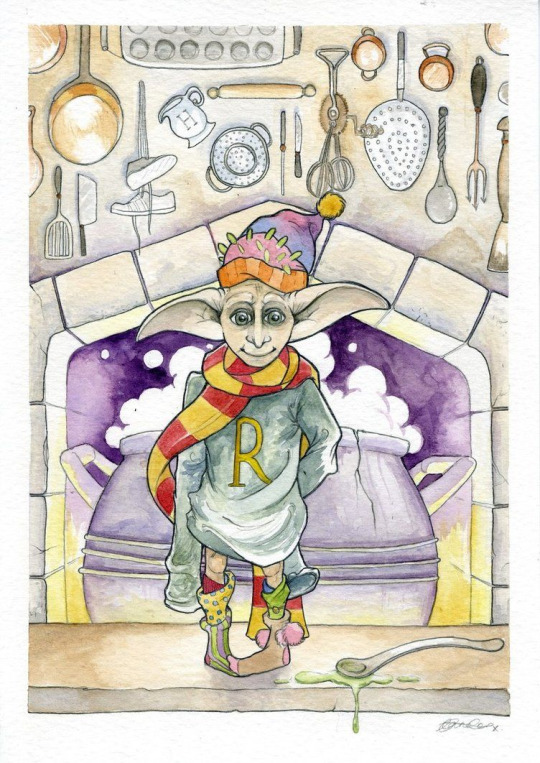
(credit to xbirdyblue on DeviantArt for this wonderful fanart image of Dobby)
The reactions to Harry’s name coming out of the Goblet of Fire is what infuriated me most in this book because it doesn’t even make sense. Firstly, does anybody really believe Harry’s capable of overcoming such powerful magic to put his name in? Secondly, why the fudging hell would Harry want to put his name in the Goblet? He’s a 14 year old child who has endured endless trauma; he’s spent most of his life living in an abusive household and the 3 years he’d been at Hogwarts fighting against Voldemort. He doesn’t want fame or glory, he just wants to live a normal, peaceful life and hang out with his best friends. Ron’s reaction is particularly annoying because he of all people should know Harry wouldn’t put his name in the Goblet. I understand why Ron felt that way and I love him but...
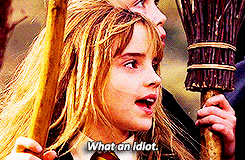
The one thing I did enjoy about this book is the evolution of Harry’s friendships with Ron and Hermione. Hermione is fiercely loyal to Harry and devoted every waking second to helping him succeed in the tasks. Despite Ron’s silly tantrum and their divide through most of the book, their falling out really does cement Harry’s love for Ron.
"He thought he could have coped with the rest of the school's behaviour if he could just have Ron back as his friend."
Harry liked Hermione very much, but she just wasn't the same as Ron. There was much less laughter and a lot more hanging round in the library."
"The thing Harry Potter will miss the most, sir!"
"Harry didn't care, he wouldn't have cared if Karkaroff had given him zero; Ron's indignation on his behalf was worth a hundred points to him."
What can I say? Ron is Harry’s platonic soul mate. That is all.
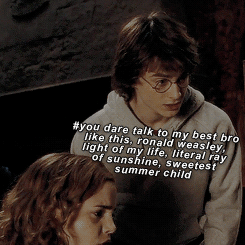
Barty Crouch’s escape from Azkaban and transformation into Moody is more cunning and intelligent than it was in the movies - this dude switched places with his mother and left her in Azkaban in his place!!

Fred and George were by far the highlight of this book for me. Their characters are great in the movies, but in the books they’re just--

Their antics, wit and banter are top notch. I’d actually forgotten that Harry gave his prize winnings from the Tournament to Fred and George, and it seems like such a huge injustice!! This act of kindness and selflessness on Harry’s part is largely why Fred and George are able to set up Wizard Wheezes. It’s a testament to Harry’s love for Fred and George that he gave them his winnings. Harry may not have needed the money but he could’ve done literally anything with it, and chose to give it to the twins because he believed in their ideas and wanted to give them the opportunity they needed.
GOF was always one of my favourite movies because of this moment:
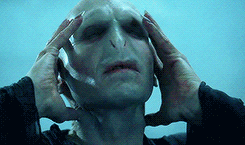
Voldemort’s return was one of the most chilling, terrifying and shocking moments for me as a kid. The scene in the graveyard still stands out as being one of my favourite scenes from the movies. In the books, it didn’t have the same impact, unfortunately. In fact, this is what was noticeable to me all the way through reading this book - I like the movie more. The movie cuts out the filler, takes the interesting aspects of the book and does them better.
Overall, despite being at the bottom of my list, I still like GOF. It’s a huge step up in world-building and is an entertaining book with a great premise; I loved the Golden Trio’s friendship, the appearances from Dobby and Fred and George’s antics. Unfortunately, this book is let down by the sheer amount of filler, the underwhelming execution of the main plot and too much focus on sub-plots like S.P.E.W.
6. The Sorcerer’s Philosopher’s Stone

It was really difficult to rank Phliosopher’s Stone, because it holds a special place in my heart because it’s where the series began. This book does a great job at introducing Hogwarts and it captures those nostalgic, magical Hogwarts vibes unlike any of the other books. This book is all about the wonder and the joy of Hogwarts, and Hogwarts lives in my heart, so stepping into this magical world with Harry for the first time again was a joy to read.
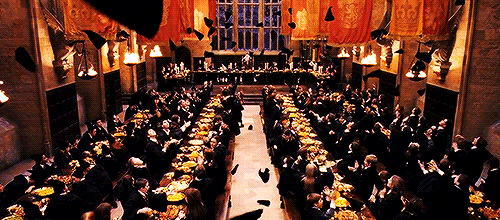
I love the time spent in this book on experiencing the smaller wonders of the magical world with Harry - Platform 9 3/4, Hogwarts Express, Diagon Alley, Ollivanders, the Sorting Hat, Great Hall feasts, ghosts etc. It’s exciting and fun to read about, and truly a gem of a book for children.
Seeing Harry go from living in a cupboard and suffering abuse and neglect to an incredible world full of wonder and people who want to get to know him and show him kindness was a joy to read. I love the development of Harry, Ron and Hermione’s friendship and how, despite how short the book is, it’s developed properly. Their friendship with Hermione doesn’t happen overnight, but by the end there’s a genuine bond and trust between them.

But of course, as the first book in the series, the plot is lacking and the writing isn’t at its strongest. Also, despite how short it is I did feel a little bored reading the second half. It’s a great entry to the series and does a wonderful job at establishing the world, main trio and other characters, but in the grander scheme of the series it’s quite bland a forgettable.
5. The Deathly Hallows
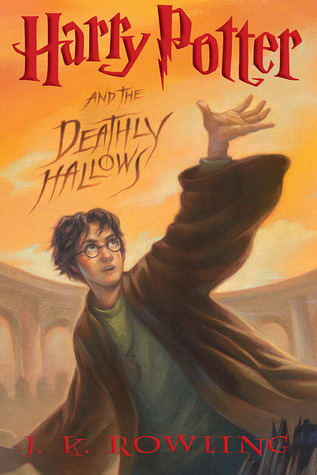
Now this one came as a big surprise to me, because before my re-read I considered The Deathly Hallows to be my favourite book, but I just didn’t enjoy it this time around. The first 50-60% of this book got me like:
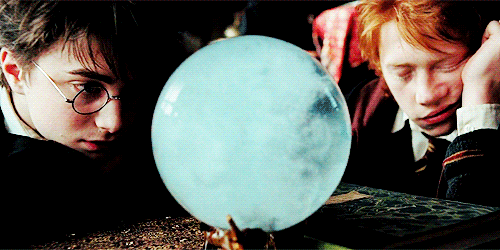
I was bored as hell. The travelling, the hunting for Horcruxes, Dumbledore’s backstory, the bickering between Harry, Ron and Hermione...it was tiresome. Fortunately, amongst that there were a lot of isolated things that I enjoyed.
Firstly, I adore the Tale of the Three Brothers, it’s interesting and I love the depiction of it in the movies - it’s just so cool!

Secondly, Ron and Hermione are very cute in this book, and for the first time I appreciated them as a romantic ship.
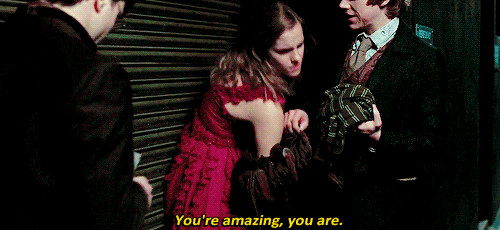
Thirdly, Harry looking through Sirius’ room and finding a letter from Lily broke my heart. This moment is so touching and completely unexpected, since I’d forgotten about it over the years.
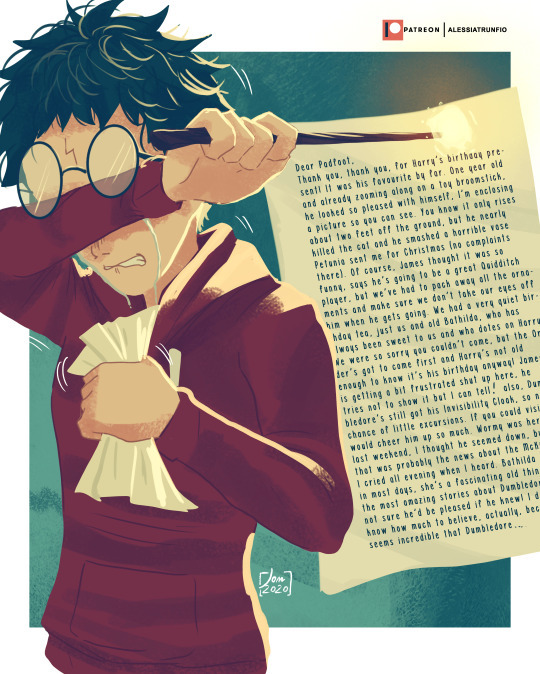
(credit to alessiatrunifo for this stunning fanart)
Fourthly, LUNA LOVEGOOD. You know what? I have no qualms in saying Luna is one of my new favourite characters since my re-read. I always liked her, but she never stood out to me, and that’s changed. It’s not just that she’s unique and wacky, but that she’s fiercely independent, moral, kind and loyal. Luna has such a strong sense of who she is and she doesn’t let anyone or anything contradict that.

Can I also admit that I might slightly ship Harry and Luna now? 🙊 Luna seeing through Harry’s disguise as “Barney Weasley” based on his facial expressions alone and their reactions to the possibility of the other being in danger touched my heart.
"'She will [survive],' said Harry. He could not bear to contemplate the alternative. 'She's tough Luna, much tougher than you'd think. She's probably teaching all the inmates about Wrackspurts and Nargles.'"
"Oh, no, I didn't want you to be caught!"
They’re cute, okay?
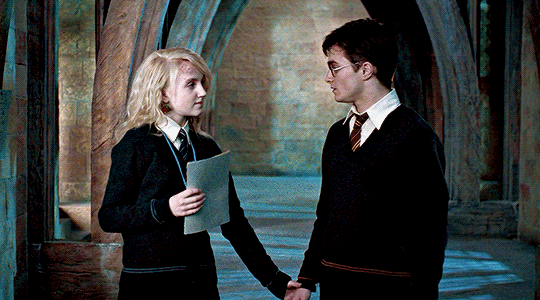
Finally, Kreacher! This was perhaps one of the biggest surprises from reading this book, because I’d completely forgotten about Kreacher’s story. And boy, oh, boy did this pull on my heartstrings. Kreacher has one of the most tragic backstories in the HP universe and he absolutely deserves the redemption he got in this book. I loved seeing him develop a genine relationship with Harry, Ron and Hermione, and the fact that they never went back for him made me so sad. Poor Kreacher!

I enjoyed all of these elements of the first half of the book, and then I got to The Sacking of Severus Snape and it was like:
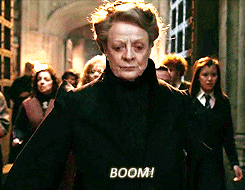
This is where the book finally took off for me (unfortunately, it took 30 chapters to get there) and as soon as Harry, Ron and Hermione are back in Hogwarts I couldn’t put it down. There are so many brilliant moments and things I loved that all I can really do is bullet point them:
The character reunions.
Percy finally redeeming himself!!!!
McGonnagal being the most badass to ever badass.
Neville Longbottom owns my heart ❤❤❤
Neville's grandmother's response to finding out Neville was fighting in the battle - "Naturally [he is]. Excuse me, I must go and assist him."
Ron and Hermione's first kiss!! and Harry’s reaction to it - "Is this the moment? OI! There's a war going on here!"
Percy handing in his resignation whilst Stupefy-ing his boss - "Hello, Minister! Did I mention I'm resigning?"
The Forest Again was such an emotional chapter. It got me good.
"You'll stay with me?" "Until the very end." 😭
"Harry, you wonderful boy. You brave, brave man."
"Perhaps those who are best suited to power are those who have never sought it. Those, who, like you, have leadership thrust upon them, and take up the mantle because they must, and find to their own surprise that they wear it well."
Did I mention that Neville is bloomin' amazing?
Kreacher!!!!!! "Fight! Fight! Fight for my master, defender of the house-elves! Fight the Dark Lord in the name of brave Regalus! Fight!"
Reading The Flaw in the Plan was soooo much more satisfying than watching it play out on-screen in the movie.
In many ways DH has some of the best, most satisfying moments of any of the books. It’s a strong conclusion to the series and there’s so much that I loved about it; so many memorable and emotional moments (Dobby and Fred’s deaths still hit hard 20 years later). Unfortunately, it was dragged down by the first half of the book and the epilogue. I tried so hard to keep an open mind about the epilogue, but the truth is it still BLOWS. And the more time that passes the more I resent the decisions that were made about character deaths. I understand that the stakes were high and we needed to lose characters close to our hearts but Fred?? Dobby??? Remus??? NO! Just no, okay? I don’t accept that.
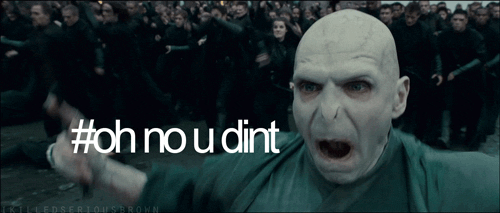
4. The Order of the Phoenix
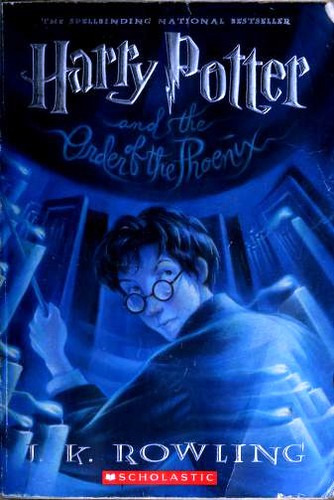
Now, The Order of the Phoenix had similar issues as DH for me - it had a very slow start but a great ending. I did take a couple of months break in the middle of reading this one and distinctly remember slogging my way through the first half and devouring the second half.
I’ve made no secret over the years that Sirius and Remus are two of favourite HP characters, so I expected to enjoy OOTP a lot for that reason. I did really enjoy all the smatterings of Sirius and Remus we go throughout this book. Unfortunately, there wasn’t enough for me. This book really highlighted for me how limited Harry’s POV was, because I wanted more of an insight into the Order but Harry was kept in the dark the entire time which was frustrating.

One of the main character highlights of this book is the legend Minverva McGonnagal. Her sass, strength and determination to defend Hogwarts and its students against Dolores is astounding. Here are some of my favourite McGonnagal moments:
"Well, usually when a person shakes their head they mean 'no.'"
"Can I offer you a cough drop, Dolores?"
"I should have made my meaning plainer. [Harry] has achieved high marks in all Defence Against the Dark Arts tests set by a compotent teacher."
Defending Hagrid against Umbridge.
And of course:

(Still can’t believe the movie robbed us of this!)
Time for a less popular opinion - I loved Harry in this book. In general, this book made me feel very protective of Harry, because Harry is bloomin’ incredible and deserves so much better than what he gets in this book. He’s always had a bad rep in OOTP for being an annoying, angsty teenager, but in my opinion, this is Harry at his most relatable and lovable. After everything Harry went through, he’s entitled to be angry with the world. He endured everything that he did and took the responsibility of the world onto his shoulders with little complaint, and in OOTP he reaches breaking point. Honestly, I’m surprised it didn’t happen sooner. The adults in Harry’s life are glaringly irresponsible in this book. Not only do they force him back to the Dursley’s after the hugely traumatic events of GOF based on some bull about “blood magic”, but they purposefully hide the truth from him even though that puts him at greater risk and adds to his emotional distress. Everyone around Harry expects him to be mature and act like an adult when he’s fighting against the darkest wizard of all time, yet don’t give him the courtesy or respect of telling him the truth about significant things that impact him and the people he loves. Sirius os the only person that refuses to belittle Harry, but in some ways, his behaviour is just as damaging as those that tried to shelter Harry from the truth, because he expects too much of Harry and projects James’ personality onto him. The adults around Harry fail him to such an extent in this book that he establishes the DA because he can’t even rely on the adults around him to keep him and his friends safe. Harry’s emotions in this book aren’t only understandable, but justified and I felt an even deeper connection to him as a result. His vulnerability shows his strength and courage more than ever before. This is the point where he goes from the Chosen One to a true champion, because even when he reaches rock bottom and wants to give up, he doesn’t walk away. I love Harry so much.
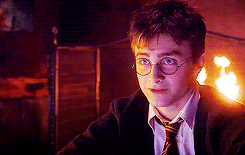
The Department of Mysteries is by far one of my favourite sections from any of the books. I love the friendship dynamics, Luna, Neville and Ginny are given the chance to really shine, the stakes are high, the action is great and despite the trauma of Sirius’ death, that moment is so hard-hitting and memorable. This section of the book just took it to a new level for me. It was really great.
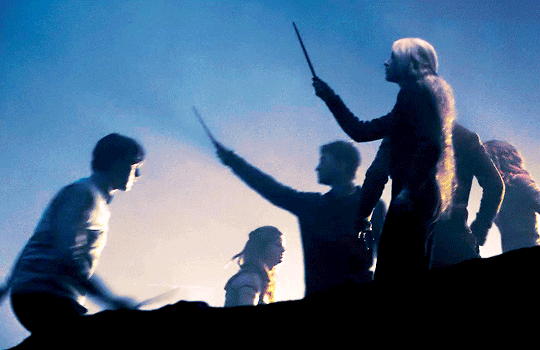
The emotion of Sirius’ death was captured so perfectly, and is such a huge turning point for Harry. Like I said above, choosing to go on even after losing Sirius proves that Harry is a true hero; that he isn’t just doing what he was doing out of obligation or has been told to but because he believes in doing the right thing. I best move on before I continue to speak about how amazing Harry James Potter is.

Now we come to Neville. Can you believe that I’d actually forgot the details of Neville being the Chosen One? It was a blast learning about that again and how he’s connected to the prophecy. I also loved that we got to see his family and not just be told about it via dialogue. Neville is by far one of the most loveable and interesting minor characters in the series. He has so many great moments in books 1-4, but he really shines in OOTP.
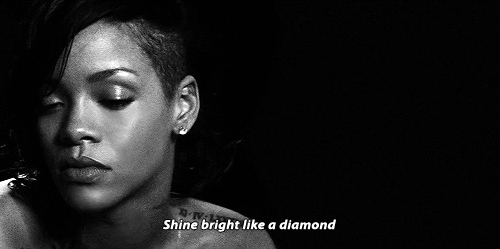
The more I write about this book, the more I find things to love. It’s just a shame that the first half lets it down, because overall, I think there’s a lot of great material here in terms of plot and character development.
3. The Chamber of Secrets
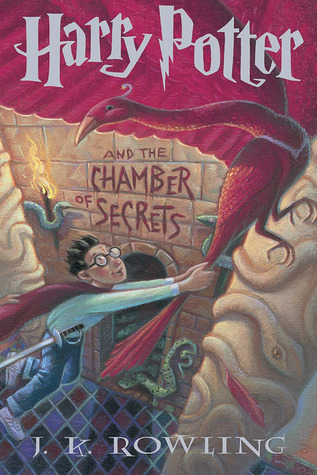
I know that The Chamber of Secrets is generally ranked low amongst most fans, but I love it. At this point, the books were more simplistic and just fun, and I like that. I also have to acknowledge that I have a deep affinity for the COS movie - I grew up watching it over and over, and of all the movies it’s still the one I know best and always come back to (still can’t believe the “Why couldn’t it be follow the butterflies line?” wasn’t even in the books!)
I love all of the different elements in this book:
Dobby
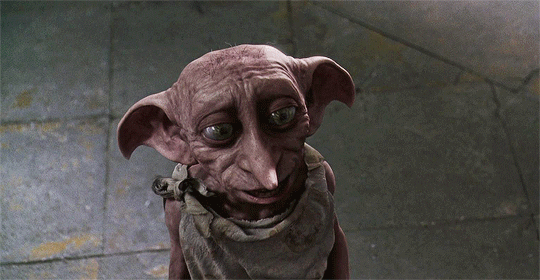
The Burrow

The flying car

Whomping Willow

Moaning Myrtle
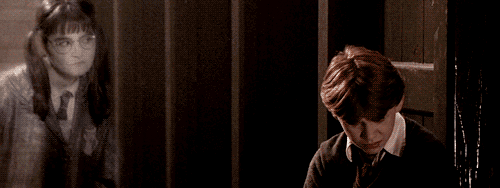
This idiot
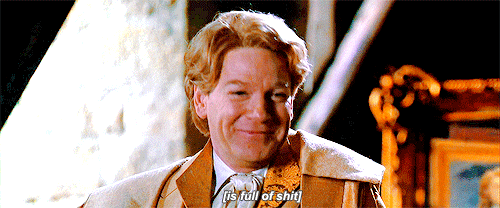
Gilderoy Lockhart is one of my favourite antagonists in the entire series, because he isn’t intentionally bad, he’s just an arrogant fool. His primary concern is his image and reputation and he was willing to go to any lengths to maintain it. He’s a bad person in a subtle and hilarious way.
Generally speaking, there are too many fun and entertaining moments to count in this book. I love the childish-ness of this book in comparison to the darker tone the series adopts from POA onwards. For me, COS still has the silliness and merriment that I really associate HP with. Entertainment value aside, the plot in COS is actually well executed.
As a short, concise and effective plot, Tom Riddle’s diary and the Chamber of Secrets works incredibly well. I liked the mystery and suspense of the culprit of the Muggle born attacks, and the big moments connected to it - finding out that Hagrid might be the perpetrator, Ginny being possessed by Voldemort, Hermione being petrified, Harry speaking Parceltongue. The stakes are high and this plot is strong enough to keep momentum going between the more light hearted moments.

Overall, COS is a quick, easy and fun read. It may not be the best written or complex book in the series, but I’m a huge advocate for it. Not only is it highly entertaining, but it also introduced a lot of great and important aspects to the series (Horcruxes, Tom Riddle being the heir of Slytherin, Harry being connected to Voldemort, polyjuice potion and Dobby), and built very well on what was established in PS.
2. The Half Blood Prince

The biggest surprise of this re-read was how much I bloomin’ loved Half Blood Prince. It has the perfect balance of plot, character development, mystery, humour and emotion. Out of the bigger books in the series, this was the one I finished the fastest (2 days), because it was quite literally un-put-downable (yes, that’s a word).
First, let’s talk about the plot, because wow, it’s a good ‘un. In my opinion, it’s the strongest and best written plot from any of the books. There’s Voldemort’s backstory, the development of Harry and Dumbledore’s relationship, Snape’s backstory, the mystery of the Half Blood Prince, Harry’s rivalry/suspicion of Malfoy, hunting Horcruxes and Dumbledore’s death. This book feels like an incredible pay-off for things that have been built up in the previous 5 books. We learn so much about certain characters - Dumbledore, Snape, Malfoy, Voldemort, Ginny - and regardless of whether I liked those characters or not, I was invested. The clues that Snape is the Half Blood Prince are cleverly interwoven within the narrative and the mystery keeps you guessing, even when you know who it is.
The last part of this book from Chapter 26 onwards was just explosive. Although I knew what was coming, I was surprised at the level of emotion I felt when Dumbledore and Harry were in the cave and when Dumbledore died. My heart was racing and I had tears in my eyes.
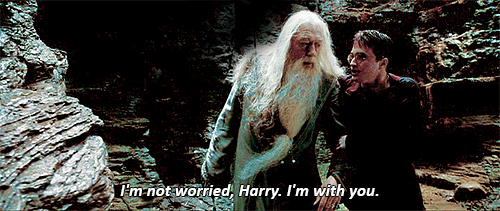
This book just doesn’t let up for a second. If we aren’t learning more about Voldemort, we’re following Draco to see what he’s up to or unravelling mysteries around the Half Blood Prince or trying to get information from Slughorn about horcruxes. Even the down time is enjoyable to read in this book (Chapter 9 was one of my favourite chapters to read) and the friendships and banter are stellar.
In terms of character development, this is also one of the strongest books. Dumbledore is finally developed beyond the omnipotent Gandalf-esque archetype and we learn bout his past and his flaws.
"I have already proven to you, I make mistakes like the next man. In fact, being - forgive me - rather cleverer than most men, my mistakes tend to be correspondingly huger."
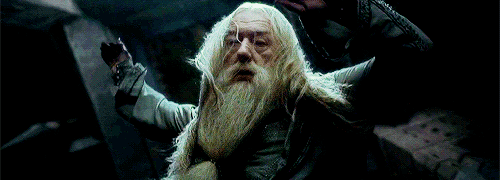
The focus on Dumbledore also sets it up for his death, and you know what? It works. If we’d lost Dumbledore prior to HBP, I would’ve been shocked and upset, but losing him at this point hurts that much more because we learn so much more about him, see how important he is to Harry and how vital his guidance is in defeating Voldemort. Dumbledore’s death feels like all hope is lost, and so soon after losing Sirius it feels even harsher.
Insight into Snape’s back-story finally explains some of his motivations and actions (though it does not condone them).
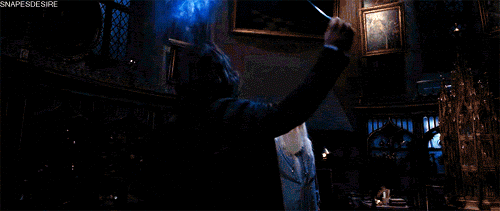
Although Voldemort’s backstory doesn’t necessarily add to our understanding of him, it’s interesting to see how he came into the world, and learn about his family background. What this demonstrated most to me is that a lot of the time there is no reason for evil. Voldemort didn’t really have any motivations for what he did. Sure, he didn’t have the perfect, happy childhood but there isn’t really enough substance there to try to explain how or why he became the monster that he did.

More could’ve been done with Malfoy, but I enjoyed him having a bigger presence in this book and how the idea that family shapes who we are isn’t always true. Draco does what is expected of him from his family, but ultimately, he has his own conscience and inner turmoil that forces him to question things.

As for Harry...he goes to a dark place in this book. OOTP has always been cpnsidered as the “angsty Harry”, but HBP takes Harry to new places. Harry feels more ruthless, reckless and determined in this book than any other. There’s an underlying sense of apathy that lingers from Sirius’ death. He obsesses about his mission to extract the memory from Slughorn and his lessons with Dumbledore, and fixates on his hatred for Draco and Snape. The fact that Harry uses Sectumsempra on Draco is honestly the most alarming thing that Harry does because it shows how dark a place Harry has gone to. He knows the spell is going to inflict serious harm and yet he uses it anyway.
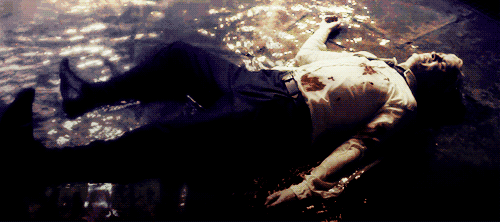
Generally, Harry abuses the potions book and manipulates, lies and takes advantage of almost everyone around him. I really see his dependency on that book and his choice to exploit it for his own benefit as adverse effects of the grief and trauma he endured. For once, he has the upper hand and I’d even argue that despite the Half Blood Prince being anonymous stranger to him, he relies on him as a mentor or parental figure. Yet despite it being a dark book for Harry, he also seems to get some genuine peace with Ginny. Although I’m not a Hinny shipper, it was so nice to see Harry experience some normality and contentment. No matter what he goes through, he remains kind hearted. I actually feel like this book more than any other emphasises that point - Harry could just as easily have gone down the same path as Vodlemort, but he made a choice not to.
“In spite of all the temptation you have endured, all the suffering, you remain pure of heart, just as pure as you were at the age of eleven, when you stared into a mirror that reflected your hears desire and it showed you the only way to thwart Lord Voldement, and not immortality or riches. Harry, have you any idea how few wizards could have seen what you saw in the mirror?"

Plot and character development aside, the comedy in this book is gold and I appreciate the movie (and Daniel Radcliffe) for maximising on that to create some of the best and funniest scenes in the movie franchise. Chapter 18 in particular was hilarious.

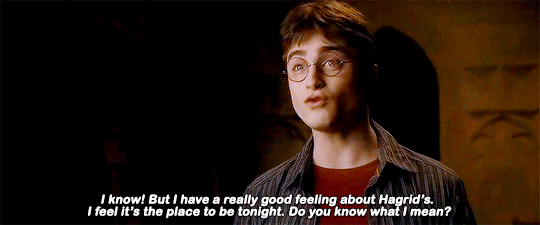

Now I have to speak about one of my favourite moments from this book:
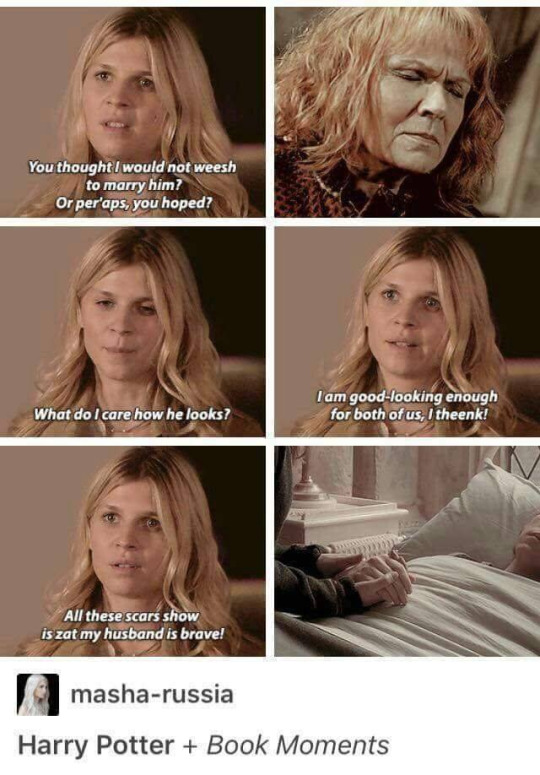
Since GoF, Fleur was grossly mistreated and discriminated against by the Weasley’s (Molly and Ginny in particular). The way they treated her was sexist and xenophobic pure and simple. They had no reason to dislike her and all of their reasons seemed to be built on some flimsy notion that she was full of herself (why, just because she was beautiful? and even if she was, what’s wrong with confidence?!) and that she was annoying and loud because she was French. Seeing Fleur finally stand up to their bigotry was fantastic. It’s a moment I’d been waiting for for so long and I’m so glad we got it, because frankly, Molly and Ginny’s beahviour towards Fleur needed to be addressed because it was disgusting.
Overall, HBP demonstrates the strengths of HP as a series. In comparison to the other books, I don’t really have anything to crituqe I enjoyed all of it from beginning to end, which is why it almost took the top spot in this ranking.
1. The Prisoner of Azkaban
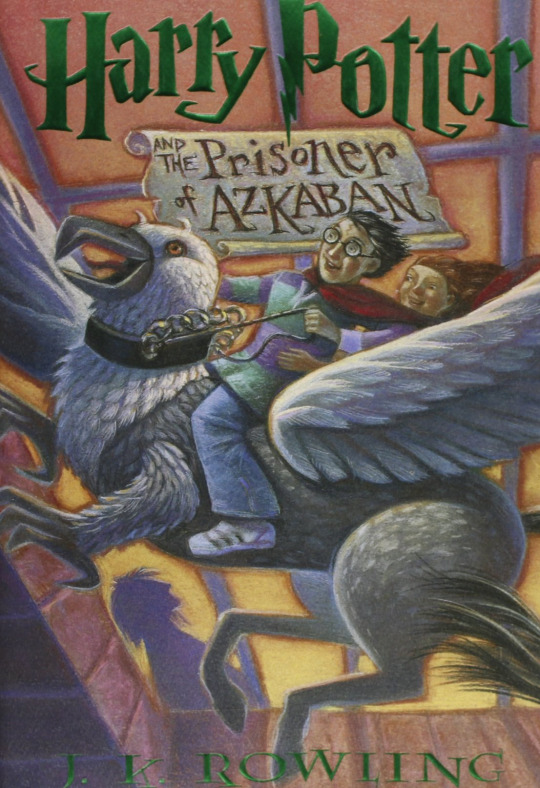
It was really close between first and second place, but Prisoner of Azkaban just managed it. This is where the HP series truly takes off and starts to shine. In comparison to what we got in PS and COS it’s richer - the plot is complex, the world building is more developed, the characters are great and it’s generally an entertaining read but with added complexity in comparison to its predecessors.
I like that POA allows us to spend so much time in Hogwarts hanging out, but that the plot comes to the forefront more. We’re all so familiar with HP at this point that it’s easy to forget the impact the plot-twists must’ve punched the first time we read them. But for me, it’d been so long since I’d read the series, that it really was like reading them for the first time and POA was one of the ones that surprised me at various points.
I’d forgot details like:
The Shrieking Shack got its name and reputation because Lupin locked himself up there during transformations; The Whomping Willow was planted to hide the secret passage to the Shrieking Shack and prevent Lupin from escaping and hurting people in his werewolf form
Crookshanks was Sirius’ ally
Sirius escaped Azkaban in his dog form
Unsurprisingly, Remus and Sirius were the highlight of this book for me. I know it’s basic but I really love them and the two of them having such a focus in this book really makes it.
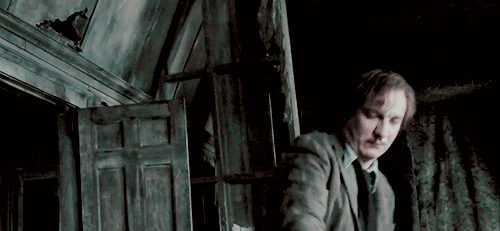
Remus truly shines in this book. He’s a lovable character – a great teacher, a supportive mentor and a loyal friend. His tragic backstory only adds to his character. Snape tries to villainise Remus for being a werewolf, but the reality is that he’s a victim. He was an innocent child that was bitten by a vicious, cruel monster and has to live with the consequences of that for the rest of his life. He carries so much self-loathing, fear and insecurity because of what he is and he doesn’t deserve it. Dumbledore is the only one that separates the man from the wolf and takes Remus on his merits. He knows that Remus is a genuinely good person and a talented teacher, and he’s willing to make the necessary adjustments to enable Remus equal opportunity. Not only does it benefit Remus for Dumbledore to do this, but the students too, because let’s face it, Remus is a bloody damn good teacher.

Remus is arguably the most decent and responsible adult character in the entire HP universe. He respects Harry’s agency but also acknowledges that he’s still a child that needs protection and guidance. Instead of lying to Harry or throwing him into dangerous situations, he does perhaps the most helpful thing any adult ever does for Harry – he teaches him how to defend himself. I love that Lupin and Harry’s relationship in this book foreshadows the formation of the DA in OOTP; Lupin is the only one that teaches Harry practical DATDA skills and in the absence of Lupin as a teacher, Harry then takes on that role as a mentor and provides his friends with the skills to defend themselves.

Now we come to Sirius. Introducing Sirius as the enemy – a dangerously, mad criminal who is conspiring with Voldemort and wants Harry dead – and then revealing him to be the complete opposite was genius. Part of me wished I could completely forget so that I could experience the utter shock of finding that out for the first time. The fact that Harry saw his parents in the Mirror of Erised in PS and then finds Sirius and Lupin in this book touches my heart. Sirius is a direct link to Harry’s parents unlike anything he’s ever had. Although on the surface, their bond develops too quickly, considering that Harry is 13 years old and all he wants more than anything is to have parents and/or a connection to his parents, his quick attachment to Sirius makes sense. The thought of living with Sirius makes Harry so happy that he used it to power his patronus!!! Likewise, Sirius clings to Harry knowing that he’s the son of his best friends. He spent the entirety of his time in Azkaban knowing Harry was still out there somewhere without James and Lily and in danger from Voldemort. Immediately, Sirius provides Harry with the type of comfort about his parents that he’s never received before.
“You think the dead we have loved ever truly leave us? You think that we don't recall them more clearly than ever in times of great trouble? Your father is alive in you, Harry, and shows himself most plainly when you have need of him. How else could you produce that particular Patronus? Prongs rode again last night.”
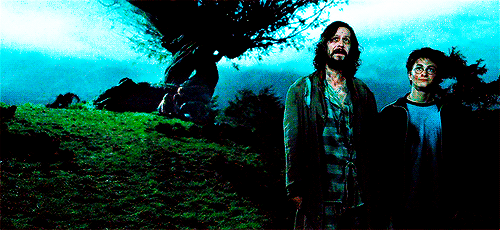
One of the highlights of this book is the scene where Snape catches Harry with the Marauders Map. That quote is just legendary.
"Mr Moony presents his compliments to Professor Snape, and begs him to keep his abnormally large nose out of other people's business. Mr Prongs agrees with Mr Moony, and would like to add that Professor Snape is an ugly git. Mr Padfoot would like to register his astonishment that an idiot like that ever became a Professor. Mr Wormtail bids Professor Snape good day, and advises him to wash his hair, the slimeball."

Admittedly, the time travel in this book is problematic as hell. I’m grateful that Harry and Hermione were able to save Buckbeak and Sirius due to time travel, but if it was up to me, I’d remove time travel from the universe completely. It doesn’t fit, it’s too complicated and creates too many issues. McGonnagal condones the use of time travel for Hermione to attend extra lessons and yet won’t use it to tackle real, important problems, like I don’t know, war, death, disease, disasters etc. Not to mention the entire Voldemort problem and Harry becoming the Chosen One could’ve been resolved by going back to the night of James and Lily’s deaths.
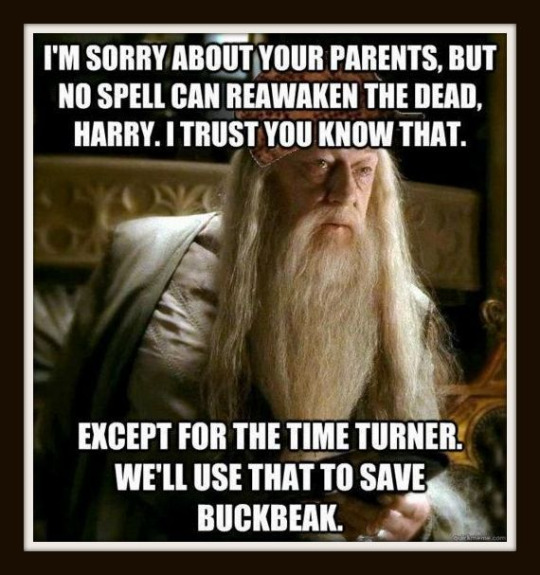
One of my favourite elements of this book was seeing Ron and Hermione’s friendship with Hagrid. A lot of emphasis is placed on Harry’s friendship with Hagrid. but this book shows how devoted Ron and Hermione are to Hagrid. They both spend a lot of their time comforting him and helping him to prepare for Buckbeak’s trial.
This book has a great balance – it’s still on the shorter side but it doesn’t suffer for it. and here’s plenty of plot and character development. Ironically, whilst HBP is my favourite because of the emphasis on the main plot, POA is my favourite because it takes a break from Voldemort. It’s refreshing to take a step away from Voldemort and put the focus onto a new villain in Sirius, and then for the twist to be revealed that he’s not actually a villain but Harry’s godfather. The time-turner is the biggest draw-back in this book, but I can overlook that because there’s so much more to love in this book. It’s definitely the most re-readable book in terms of the length and plot. This book is a happy medium which incorporates the strengths from all of the other books in a smaller package than HBP - it’s fun but expands on the universe, introduces brilliant new characters and has a depth and complexity that the first two lack whilst not having the filler that books 4-7 have.
Conclusion
It’s hard to read these books without it being mingled with childhood nostalgia, so that undoubtedly informed my ranking. Despite being a children's series, the books still hold up reading them as an adult. I enjoyed rediscovering the smaller details I’d forgotten over the years and feel much closer to the universe as a result. The characters and their dynamics are by far my favourite thing about HP. I also enjoy the whimsical magic and how this is offset against the darker tone later in the series. However, in light of JKR’s hateful rhetoric, my attention was drawn to the problematic elements of the books such as the portrayal of slavery in addition to:
Lack of major/well-written characters of color
Anti-semitic caricature of goblin bankers
Cho Chang’s name (which many consider offensive), stereotypical placement in Ravenclaw (the smart house) while being the only East-Asian character in the books, and she functions almost exclusively as a love interest
Ableism all-around
Nagini, an evil snake who gets chopped in half, is actually an Asian woman according to Fantastic Beasts, making her the second of two named East Asian characters in the franchise
“Magic in North America,” a history of magic in North America published on Pottermore that grossly misappropriates and misconstrues Native American cultures
Anthony Goldstein, retconned token Jewish character, also stereotypically named
General stereotypical naming of non-Anglo-Saxon characters
Remus Lupin’s werewolf status as an AIDS metaphor while depicting his condition as making him monstrous, and the man who bit him goes around biting people for kicks
Declaring that Dumbledore is gay with exactly 0 in-canon references, and no other LGBTQ+ representation
(article credit: Separating Art from Artist - Thoughts on J.K. Rowling written by Melina List on Medium)
This is the last time I will read these books, partly because I’ve outgrown them, but mostly because I can’t, without a heavy conscience ignore the relationship between JKR’s hateful views and her works. If you want to learn more about this, I’d recommend checking out a post from my_weird_bookish_heart on Instagram which explains why we couldn’t and shouldn’t ignore the problems in these books by adopting a “art is separate from the artist” mentality (if you would like the link to this please message me and I’l be happy to share it. We can all still love and enjoy HP, but we all have a moral duty to acknowledge and take responsibility for this and not feign ignorance. Views like JKR’s directly harm individuals and groups, not just in the trans community but also the Jewish and LGBTQIA+ communities and people of colour. I can’t and won’t accept that in silence. No matter how special HP was to me as a child, the lives of real humans are unquestionably more important.
Thank you for reading.
#hp#harry potter#hp books#harry potter books#hp review#hp book review#hp meta#mine#my meta#reposting from my sideblog cos i spent legit HOURS writing this and adding gifs and don't wanna lose it when i delete the blog
13 notes
·
View notes
Text
okay time for a theatre hot take about historical musicals. im gonna split this into two posts, one about hamilton and one about six. because while the easiest way to put it is “hamilton bad six good”, there’s a bit more nuance to my opinion on them both than that.
First off, all the cast members are insanely talented, especially Leslie Odom Jr, Daveed Diggs, Christopher Jackson, Phillipa Soo, and Reneé Elise Goldberry. Even though the people they played were varying degrees of assholes, they managed to make them feel compelling. Credit where its due.
anyway, lmm is a good songwriter, the issues with hamilton come from the glorification of the historical figures portrayed. if hamilton was more critical of these individuals, it might not have been such a... yeah.
the hardest hitting songs are the songs that delve into the personal lives of the individuals rather than politics. Satisfied, Wait for It, Helpless, Burn, Dear Theodosia, It’s Quiet Uptown... these are all incredibly emotional and raw. Aaron Burr was a fascinating individual and all of his songs reflect this, honestly. IRL, Burr was actually one of the least scummy of the cast, though because he wasn’t very fond of Hamilton, he is villanized. unsexy. Leslie Odom Jr. has such a powerful voice and does an incredible job as Burr.
some of the songs about the war are also decent works. Stay Alive talks about the actual conditions the American militia put themselves through, and The World Turned Upside Down, while it’s a very patriotic (ew) pov, is still a well written victory anthem. the most interesting one is History Has It’s Eyes on You, and having Washington sing it was a great choice. it’s one of the few songs where a founding father is looked at critically for their failings, and said founding father point blank says that those who come next will judge whatever you do. Christopher Jackson is an amazing vocalist and he actually has talked about his struggle to play Washington despite Washington being a dick.
the songs about politics tend to fall flat because they oversimplify the actual views of the main character and paint everyone around him as either a villain or ally based on whether they liked Hamilton. the cabinet battles especially are pretty cringe. there are a couple exceptions that I’ll discuss in a moment, but first, a character analysis tangent.
Thomas Jefferson is... an interesting case. Irl, the man was a disaster of a person. He came down with migraines from talking to women, was generally considered a weirdo, and was the original “rich person who buys expensive versions of the ugliest clothes and acts like he’s presentable”. Yet aside from one line in It Must Be Nice, he’s portrayed as a extravagant, dramatic, yet mildly charming asshole. His costume is bright purple, he carries a fancy cane. Like, ignoring the fact that its inappropriate to ever make Thomas Jefferson seem charming, this isn’t even accurate to who he was as a person. He was less sociable than Isaac Newton for fucks sake. The only accurate thing is being a france weeb and being a worse debater than Hamilton.
Anyway, speaking of It Must Be Nice, its one of the few good political songs. It’s critical of Hamilton and it explains why the Madison and Jefferson hate his guts (though for stupid reasons). Furthermore, it also explains the political climate of the day better than other political songs in the musical. The other two good ones are, of course, The Room Where it Happens and Your Obedient Servant.
The Room Where It Happens is not only an amazing breaking point for Burr to stop waiting around, it’s the one time in the musical where the real Alexander Hamilton is best represented. (Hamilton in yellow, Burr in blue)
“Or did you know even then it doesn't matter where you put the U.S. capital?
Cause we'll have the banks, we're in the same spot
You got more than you gave
And I wanted what I got
When you got skin in the game, you stay in the game
But you don't get a win unless you play in the game
Oh, you get love for it, you get hate for it
But you get nothing if you wait for it
God help and forgive me
I wanna build something that's gonna outlive me.”
This is the real Hamilton. The facade of caring about ideals is gone, and the truth is bared; Alexander Hamilton was a smooth talker who only did things when he saw it could benefit him in some way. The man was obsessed with his legacy, and anything that got in the way of him building one was just collateral. Yes he was crass and loud, but guess what? That usually meant he was heard over everyone else. Burr only just realized that the whole “scrappy underdog” act was just that; an act
Your Obedient Servant is Burr calling out Hamilton for going back on everything he claimed to believe just to keep Burr from the nomination. Fun fact: the 1800 election was not a landslide victory. It was incredibly close. Hamilton’s endorsement was probably what kept it from being a tie.
Hamilton tries to defend himself by projecting his flaws onto Burr. “I am not the reason no one trusts you, no one knows what you believe” isn’t an accurate depiction of Burr in the slightest. Burr actually quite enjoyed politics and debates, and none of his setbacks ever kept him down for long. He cared very little for what his contemporaries thought of him though: He relied on the merits of his points. A lot of his correspondence was left to his daughter, Theodosia, and was lost on the shipwreck that killed her, so theres a lot we don’t know about him. But the musical depiction of him is not really accurate.
The problem with Hamilton isnt that it’s a musical about the founding fathers. Its that it grossly misrepresents those founding fathers. It never considers the thoughts of the slaves of any of the main characters. It never considers the Native American perspective on the Revolutionary War. It mocks John Adams, despite him being one of the few founding fathers who not only didn’t own slaves, but publicly berated his contemporaries for relying on slavery. It does a great deal of injustice to Burr. It woobifies the Schylers. For fucks sake, it forgot Benedict Arnold. Ya know, one of the most famous spies? Who almost cost America the War?
Its impact on modern political discussion and internet culture is also kind of a net negative, save for the production “The Haunting of LMM”. Its status as a fucking joke these days is earned. Though it has some good songs, and the fact that it got an official recording means good things for the future of Broadway accessibility, it’s a hot mess and is an example of how not to do a historical musical.
18 notes
·
View notes
Text
Randou and the Sins of Season 3's Fifteen Adaption (Interlude)
Episode 27 — The God of Fire: A Post-Section Addendum
Forgive me for backtracking for a brief moment, but in hindsight, there were two small things — particularly relating to the subsection of this section, which is titled “The Confrontation with Sheep at the Arcade” — that it seems I failed to properly address in my initial posts on this subject.
After realizing this mistake during the long struggle to get back on track with rolling out the rest of my article, it became apparent to me that I had three choices: I could go back and try to edit this information into the main article, hoping that it would fit well into what already existed without clashing with the carefully written transitions between sections, I could wait until the very end of my article and then make a post addressing the matter in hindsight, risking my audience becoming and remaining conflicted over certain bits of information until then, and being totally unaware of the one thing I accidentally skipped over, or I could simply make a separate addendum such as this to address it here and now, as soon as possible, and not have to worry about fitting it directly into the previous section for the time being — without having to give up either the chance to talk about it now or even to potentially go back at the end and try to fit it back into the main article at my leisure, as well.
Naturally, as I’m more than sure you can already see for yourself, given that you’re reading this, I decided to go with the last of these options, as I felt that this was the one that would offer the greatest amount of opportunities, with the least amount of potential problems that could come out of it. As for whether or not I will eventually, upon the completion of this very long analysis and review, attempt to backtrack and merge this added data into its rightful place in the main piece, that is something which I will have to decide when the time comes, even if I have a very optimistic outlook on this prospect right now, but in the meantime, I will just be sharing it with you here, and placing the link to this post somewhere in the Masterlist between the discussions on Episode 27 and Episode 28.
On one final note before we jump into this, if this post seems a bit sloppier than usual or just flows less smoothly than the rest of the article in any way, I truly apologize, but if that is indeed the case, it is likely due to the fact that I have had much less time to plan for my discussion of these things than I have had for everything else I’ve talked about up until this point. I promise that if in hindsight I should sense any need for it, I will attempt to re-write it in a better, more comprehensible format at a later date, but at the moment, I’m afraid that this is the absolute best that I can do if I am to get this information out in a timely manner.
Now, with that said, let’s go ahead and get into the actual things I’d like to talk about.
Dazai’s Previous Invitation to Join Sheep, and the Gang’s Initial Misunderstanding About His Affiliation
Okay, so this one is honestly a little embarrassing for me to admit to forgetting in hindsight, purely because of how often the subject is referenced in the novel despite being completely removed from the television series’ adaption, but in earnest, part of the reason I didn’t even think about it at the time was due to just how inconsequential this information was in the grand scheme of things; nevertheless, for those of you who truly want to know everything that was changed or omitted from Fifteen in the anime — or even just want to know more about the events and details of Dazai’s life — these facts probably still will be of some interest, so I will mention them anyway.
Contrary to how the show presents it, in the original version of the tale, Sheep actually do not immediately look upon Dazai as a threat when they first meet him in the arcade, nor does it even cross their minds that he might be a member of the Port Mafia; rather, their first thought upon seeing and conversing with him was simply that he had to be someone whom Chuuya had been looking to recruit into their own ranks.
Interestingly, it was also very briefly mentioned much earlier in the novel by Dazai himself — back during his and Chuuya’s initial meeting in Suribachi City — that the bandaged brunet actually was once handed a formal invitation by Sheep to join their organization but ultimately refused their offer, although this does not appear to be the reason why the gang now mistakes him as a potential new member of their group, given that, at the very least, the members there in the arcade seem not to recognize him whatsoever; in fact, they even question Chuuya’s behavior in seemingly having chosen to induct him without first receiving the council’s pre-approval — an accusation which Chuuya curiously, actively chooses not to correct, likely purely because he does not want to look like a traitor in their eyes, should they realize Dazai was actually with the Mafia.
Indeed, it isn’t until Dazai purposefully outs himself as a mafioso in order to stop them from taking the redhead away with them that Sheep realizes the truth of things — at which point Dazai ends up having their captive members released in order to appease them, as we see in the anime, and things then go on to unfold as I have described previously in my article.
However, while of this might be very intriguing and, at the least, a bit insightful into how Dazai knows as much about the organization as he does, to be totally earnest about the matter, I must reiterate all the same that the removal of this information from the show was on the whole a very wise one that I can wholeheartedly support, for its existence truly doesn’t affect the overall storyline in any majorly impactful way, whatsoever — so much so that even I, a very dedicated Fifteen enthusiast, was able to easily forget about its existence during every one of the multiple times I wrote, read, and re-wrote the section dealing with the episode in which it mostly would have been present.
Looking back on it from that angle, I suppose, then, that my failure to bring it up prior to this probably did not change all that much, but still, in the interest of transparency and thoroughness, I wanted to make a small addendum post about it, anyway — and besides, there was already another matter regarding the arcade scene that I needed to speak on to begin with, so why pass up the opportunity to do this at the same time? There was genuinely no reason why I should have resisted.
Sheep Truly Being the First to Leave the Arcade in the Novel & DarkestJay8686’s English Translations
Now, in regards to that other matter I needed to address, for anyone who might have already read and/or started reading only DarkestJay8686′s English translation of the Fifteen light novel upon discovering my article, I am sure that there is probably a lot of confusion resulting from the conflict between my assurance that Sheep were the first to leave the Arcade before Dazai and Chuuya, and DarkestJay’s translation, which depicts the exact opposite of this, and for that I deeply apologize — not because I am wrong about it (as I am not), but rather, because I failed to discuss this apparent contradiction back when I first brought it up, even though, rightfully, I should have.
Be that as it may, I need you to understand that I did actually have a specific reason for why I had previously chosen refrain from talking about it, as although I did sincerely think about and even strongly consider adding mention of this whole ordeal to my disclaimers and notes at the beginning of this article back when I had first prepared to post it, in the end, I was simply too concerned that it would be considered somehow rude or unfair for me to do so.
My train of thought back then was — mistakenly — that to express anything other than complete praise and pure, unconditional endorsement of DarkestJay’s work would be to instantly and irrevocably make myself come off as a disrespectful, ungrateful monster who has no appreciation for the people who dedicate their free time to making these stories available to non-Japanese speaking members of the fandom, no matter how kindly I may have tried to word what I had to say. I was utterly terrified that, even if I spoke highly of the translation as a whole and encouraged people to read it, if I also had explicitly addressed the reason why I personally did not recommend using it as the sole source of knowledge of the book at the same time and mentioned any of the mistakes I found to be made within their interpretation of events, then I would be seen as criticizing the author for things that truthfully were likely to largely not be in any way their fault.
Obviously, in hindsight, this line of thinking was not the best to listen to in light of the misunderstandings it could cause, and I realize that, but these were nevertheless my thought processes at the time; having had time to think deeper on the circumstances now, though, I of course have also come to the conclusion that none of these other concerns of mine need be had, so long as I try to approach the matter as delicately and respectfully as I can, however big these fears may have been at the time, and so, I intend to finally speak about it at long last.
Furthermore, while I in no way want to seem like an opportunistic profiting off of someone else’s misfortune — as I assure you that I, too, was quite saddened to hear of their struggles and wish it hadn’t happened — seeing as that their work was nonetheless sadly removed from WattPad, and they had to relocate to another platform where they wouldn’t have to fear censorship again, thus requiring me to have to provide y’all with a new link that actually works and leads you to where you need to go to read it, I think that is really the perfect time for me to preface my sharing of that new link with this little PSA of a sort.
So, if you’re keen on getting that new link I mentioned and want to learn about the reason why my information about Sheep’s departure from the arcade doesn’t line up with their translations, as well as why it’s inadvisable to use their otherwise mostly excellent translations as your sole source of info on Fifteen rather than reading it alongside the other trusted translation I have provided at the beginning of my article, feel free to hop on over to this post to find out.
[View the masterlist]
#linklethehistorian#bungou stray dogs#bsd#bsd spoilers#spoilers#bsd season 3#bsd novels#fifteen#Arthur Rimbaud#bsd arthur rimbaud#Randou#justiceforrandou2k19#justiceforrandou2k20#justiceforrandou2k21#fifteen article#Randou and the Sins of Season 3’s Fifteen Adaption#Episode 27 — The God of Fire#writing#My writing#my thoughts#The Confrontation with Sheep at the Arcade#Interlude#Post-Section Addendum#Sheep Truly Being the First to Leave the Arcade in the Novel & DarkestJay8686’s English Translations#Dazai’s Previous Invitation to Join Sheep and the Gang’s Initial Misunderstanding About His Affiliation
6 notes
·
View notes
Text
Mafia: City of Lost Heaven
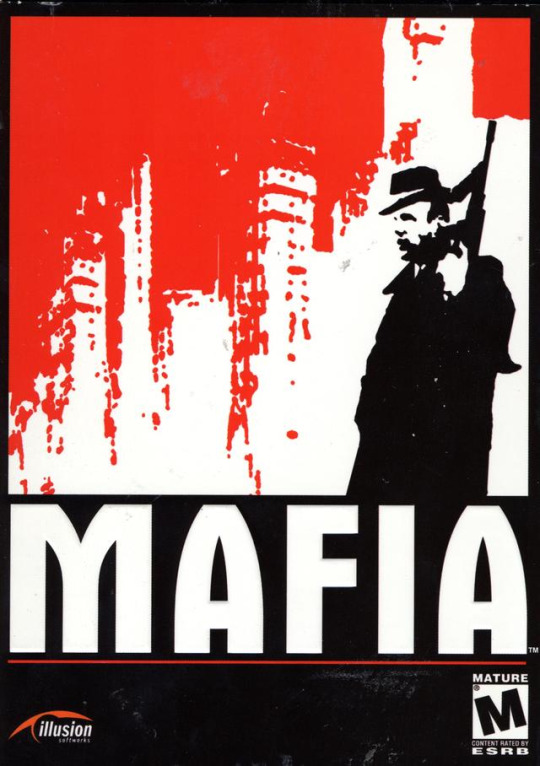
The original Mafia from 2002 by Illusion Softworks is a weird and fascinating game. It is a third-person shooter somewhat in the vein of the GTA series.
It is set in the 1930s and is about a Mafia family, the Salieris in the fictional city of Lost Heaven. It focuses on the rise of player character Tommy Angelo in the Salieri organization. It is a standard gangster movie plotline, with the Godfather and director Martin Scorcese being referenced often. The character wants the money crime can give him and is successful as a mafioso, but he experiences conflict between the horrible things he must do and his conscience. This contradiction eventually destroys him and the story becomes a tragedy.
This cinematic gangster tragedy is an unusually ambitious story for an action video game at the time, and it isn’t entirely unsuccessful in those. Mainly it is because the 1930s gangster film atmosphere is so fully realized, more than the actual writing. The writing isn’t terrible, Tommy’s story is a coherent tragedy, but it does not quite reach the high level of its gangster movie inspirations.
And it has many of the problems of the genre, except even more so. The game depicts the mafia in quite glorifiying ways. The mafiosos in these guys wear nice suits and fedoras, drive nice cars and get to have cool gunfights with Tommy guns. And yet the story tries to have it the other way too, with the mafia depicted as ruthless violent people and crime leading to a tragic end. Tommy is himself frequently appalled at the things the family wants him to do and ultimately he ends up badly because of his mafioso life. The contradiction is obvious. It is the same trap the gangster films that inspired this game fall into. Gangster films want to show this cool escapist fantasy of gangsters because it is fun, yet both storytelling logic and any moral analysis demands crime leads to tragedy.
The story also has the problem of this opposition between “good” gangsters and “bad” gangsters that doesn’t make much sense. The plot driving the story for basically 4/5 of the game and especially the middle levels is this rivalry between the Salieri and Morello families that eventually becomes an outright war. And in order to have a more easily graspable “heroes and villains” situation, the narrative is clear that the Morellos are the worse mobster family. Don Morello kills people for bumping into his car and tortures people to death. He is presented as a vile and repellent villain from the first. It is the Morello mobsters which you kill for most of the game, and you kill a lot of them, and this somewhat over-the-top villainization is meant to justify that.
And Salieri doesn’t do these kinds of things, he doesn’t deal in drugs either and fights common thugs who mug and sexually assualt women. He is the “good” kind of gangster. Even his collecting of protection money is presented as actually providing some form of protection. It is an implausible idea to say the least, and the game is certainly aware of it. What drives the plot inthe last four levels of the game is that Don Salieri is becoming morally worse after his final victory over Morello, getting more greedy for money and power. Butthe game depicts him as committing ruthless murders even before that point. This inherent evil of the mafia is what drives the actual main storyline: the tragedy of Tommy.
This Salieri vs. Morello plot feels hollow, the game’s attempts to subvert it doesn’t work because it doesn’t feel credible to begin with. The over-the-top villainy of Morello and Salieri’s softer actionsfeel like sentimental nonsense from the very start. “This gangster is good, he protects people from common muggers OwO, but this gangster is bad, he tortures people >:(“. Salieri’s slide into further villainy after Morello’s defeat doesn’t feel credible either. For a subversion like that to work it must have some plausibility to start with, some emotional resonance with the audience, and it just doesn’t.
It makes the game feel like it buys into the glamorization of crime that is often present in the genre more than most actual gangster films do.
Speaking of that, I should mention the sexism of this game. Most gangster films certainly depict a male-dominated culture. In that, the genre reflects the real-life mafia, which is extremely male-dominated and misogynist, and it is arguable how much those films endorse that sexism as opposed to merely depicting it.
And I would argue Mafiafalls into endorsing it, at least in its storytelling. There are only tworeal female characters, and each only appears in one level each. Sarah is an especially outstanding example, for she becomesTommy’s wife. The level in which she appears Tommy rescues her from a sexual assault by some muggers and they have sex and fall in love. This is said to lead to their marriage, and I do literally mean “said” because we never see her again after that level. Tommy mentions her occasionally and his marriage to Sarah and their daughter is by his own admission his most important motivation.
And that is the purpose of women in the story of Mafia: to provide motivation for their husbands. Two other gangsters are similarly driven by their wifes and children to break with the Salieri family’s obligations, in explicit parallels to Tommy’s situation. And it is not just sexist writing, it is ineffective writing too. Tommy’s marriage is meant to be very important to him as a character, and it is problem in the actual story it is never shown. We never get to see Tommy’s and Sarah’s supposedly idyllic family life, only hear Tommy talk about how it is the most important thing for him, which weakens any emotional empathy we might feel with him.
The level with Sarah at least features a bunch of dialogue between Tommy and Sarah and it is nice I suppose, but it is not enough. Sarah is also depicted as a bit of a bimbo or at least extremely naive, as she doesn’t seem to be aware the Salieri’s are well a mafia family, which seems unrealistic considering how closely connected she is with them. (She grew up as the daughter of the bartender in the Salieri’s Bar and works there, a location in which they literally shoot rival gangsters in at one point).
The writer of Mafia, Daniel Vavra would many years later become a gamergater, probably the most prominent developer to sympathize with the movement. And while it is of course a disappointment, it is not entirely unexpected. He was by far not the worst misogynist in video games or anything,
but just looking at Mafia, it is not strange at all that Vavra as a game writer would feel threatened of the very idea of feminist analysis of video games.
I talked about the story far more than I wanted to when I started writing this, and it is actually not the most interesting thing about this game, it is actually the city of Lost Heaven itself, the attempts at realism in the gameplayand the cars.

The city of Lost Heaven is one of the more fully realized cities in video games, and it is clear a lot of effort and thought was put into its design. Even the map of the city which you use to navigate it showed a lot of effort. It has (printed)creases, stains and pen markings drawn on it just like a real map would. The original box(that I owned) came with an actual physical copy of the map, which was very fun to have,although bringing up the map in-game by pressing tab was certainly the more practical option.
It is perhaps not a huge world compared to modern open-world games, but it was huge for 2002 and it is varied in a semi-realistic way. Lost Heaven is divided into various distinct areas just like a real city would. There is an industrial area, a working class housing area (“Hoboken”), a detached housing area for the upper middle class on the outskirts (Oakwood), an area with mansions for the rich (Oak Hill), ethnic ghettos like Chinatown or Little Italy. The basic idea seems to have been is to recreate an American city from the period in miniature.
And the areas have been given a lot of effort to make them appear more tangible. The building models and textures are different of course, but you can also detect a difference in the pedestrians. People in working clothes walk around in the industrial area and the working class area of Hoboken, whereas you can primarily see the nice looking suits and dresses in the richer areas of of town. It clearly took great effort to program and it contributes greatly to the mood. Even the cars seem to vary slightly, with the older and cheaper cars more abundant in the poorer districts, but the difference I think is lesser compared to the pedestrians.
The care with which Lost Heaven was constructed creates this compelling atmosphere. It feels like you are driving around in a 1930s American city. The aesthetics and atmosphere make the gangster story work better than it otherwise would. Lost Heaven simply feels more real than most video game cities do. And this is despite the dated graphics.The textures might oftenbe very grainy, shop signs especially are a blurry mess, but even they were made with some effort.
Let’s talk about the cars too, because they encapsulate this game in both aesthetics and gameplay. The cars are all based on real cars of the period, even if the names are all changed to avoid any claims of trademark infringement. Fords are called “Bolts” and Chrysler Airflows are called “Ulver Airstream” for example. If you know anything about older cars, you can however easily recognize many of them them under the changed names. an early game car is unmistakeably a Ford model T for example. Also some cars are far more common than they should be, like the concept car Pierce Silver Arrow of which only five were built is a common rich man’s car in the game under the name “Silver Fletcher”.
The cars driven by the NPCs are used to show the passage of time in the game, which goes from 1930 to 1938. As the years go by in story, older cars get more uncommon (but don’t disappear entirely) and new models are introduced. Your access to cars in gameplay also improves as you progress in the story. You go from slow, fragile cars like the aforementioned T-ford to fast, powerful and sturdy cars. The effort put into the cars from the research to the NPC programming is another thing that helps create the compelling mood of Mafiaand the city of Lost Heaven.
The cars are a good example of how the game often prioritizes atmosphere and verisimilitude over fun and accessible gameplay. The driving in this game is not a side-thing like it would be in most action games and cars in this game handle fairly realistically for this type of game. It is still arcadey, but far less arcadey than you would expect from a non-driving simulator. And most importantly, cars are period accurate in that they are both slower and more clunky to handle than modern cars.
Damage to the car also has more consequences than you might expect. A crash might damage the engine causing the car to go slower, a bullet rupturing a tyre makes the car far more difficult to handle, a shot to the gas tank will cause the fuel to leak out(fuel is never really a problem in the primary story mode, but it is there as a game mechanic and can be relevant in the free ride mode). The early-game cars are more fragile and vulnerable to crashes and the like, but none (outside a special car in the game’s free ride mode which not available in the regular story) are immune to these problems.
So this game prioritizes realism over player enjoyment, practically the only obvious concession to the player is that you always have automatic gearchanges available, but you can also choose to change gears manually if you want to. It is frankly oftenfrustrating, even the best cars in this game can be difficult to handle.
Car chases in this game are brutally difficult because of this, and the game’s most infamous level is the fifth one where you have to compete in a car race, driving a fairly period-accurate racing car. It has perhaps the best speed and acceleration of all the car’s in this game, but handles terribly. It is perhaps the most difficult level in the game, and even the developers seem to have realized how unfair it is. You could cheat in the original box copy version of the game which I played as a kid and the GOG version has an easy mode for the race.
A lot of the game is actually about this car hierarchy mentioned before. Typically at the beginning of each level you are given a new car by the Salieri’s mechanic Ralphy, and it is usually better than the car he gave you last level (he also teaches you how to steal it, which isn’t that useful in the story mode, but gives you that ability in other game modes). At the end of most levels, you are also given the opportunity to do an optional side-mission for another mechanic, Lucas. If you succeed, Lucas teaches you how to steal a really capable car. Typically the car you can get from Lucas will be better than the ones Ralphy will give you for the next 2 levels at least.
So the clunky car mechanics both give period verisimilitude and a sense of progression throughout the game.
And it does certainly add to the atmosphere and sense of realism. Mafia’s cars feel more real than most video game cars, but they are also oftenfrustrating to use in gameplay.
But Mafia priortizing its verisimilitude over player enjoyment doesn’t stop there. In each level you are given an objective, typically somewhere else in the city than where you start (which is usually Salieri’s bar). And you have to drive from the starting point to where the actual level starts. After the level is over, you have to drive all the way back.
You can’t just speed your way through the city either, because Lost Heaven’s cops will notice you breaking the speed limit or running a red light and fine you. The fine doesn’t actually cost you anything in the story mode, but it takes up time and negates any time you won by speeding. You can run away but the cop cars will follow and try to arrest you (which is a game-over), and if you try to kill them they will shoot back. The police will usually radio in for back-up too, so you will have to evade or kill the cops (including the back-up) to escape, both of which are fairly difficult.
So the best idea is to keep to the speed limit of 40 mph and don’t run any red lights. You can toggle a speed limiter with the F5 button which caps your car’s speed at 40 miles. It adds to the realism the developers are going for, but in order to play the actual level you have to have this bit of tedium with the drive both before and after. It is basicallya commute except with a varying destination.
The developers was probably aware of the tedium on some level. During the first half of the second level you get to play Tommy during his pre-gangster life as a taxi driver. It is literally just driving from point A to B under a time limit, and the customer will get cranky if you crash the car, and getting a speeding ticket is game-over here of course. The customer dialogue is often rude and theydoesn’t even thank you for most of the time. It is super-tedious and clearly intended to get the player to understand why Tommy became a gangster, since this boring dead-end job is his alternative. The problem of course is that a lot of his life as a gangster consists of driving from point a to point b in a similar fashion.
The game’s obsession with verisimilitude also extends beyond the driving to the action. Without being entirely realistic, Tommy is on the flimsier side of shooter game protagonists and can’t take a lot of bullets before dying. It is like in Max Payne, where a point-blank shotgun blast can practically kill the player character in one hit. You can find healing in first aid boxes boxes, but they are rare. Reloading before your magazine is empty also means you lose any bullets left in the magazine.
And unlike Max Payne, there are no quicksaves or manual saves whatsoever. Saves are done automatically at certain checkpoints and you have to re-start at those if you die. This save system makes this game extremely difficult, since you have to sometimes practice entire segments in order to progress. It is a lot of having to memorize where an enemy mobster pops out so you can shoot him before he shoots you.
The combat is certainly well-made and sometimes quite fun. There are like the cars some weak weapons, but overall weapons feel powerful and the environments and set-pieces are often enjoyable. But the action like the rest of the game is frustratingly difficult.
And that is the game, pretty much. You have a tedious drive to have a big spectacular shoot-out that is frustratingly difficult and you have another drive back. Sometimes there is a car chase, but that’s it. There is a stealth level that tries to change up the formula where you break into a villa, but the game is not really built for stealth so it is frustrating and very much not fun. Then there is the side-missions from Lucas on your drive back, usually a timed fetch-quest of some kind. They do add variety and have some interesting story ideas but can be frustrating in their own right.
There is also the free ride game mode, where you get to explore Lost Heaven freely and do whatever you want, although there is not that much to do, except get into car chases/fire fights with cops or random gangsters you can aggro if you want. The oddest game mode is “free ride extreme”, where you get to do various bizarre quests to unlock equally bizarre cars. It is a weird mode, especially for this game, as you have this usually serious aiming-for-realism game letting its hair down and going for outright comedic surrealism.You get to chase down a super-fast npc named Speedy Gonzales, that sort of thing. The mission certainly have surreal imagination to their credit, even if they can be as frustrating as the rest of this game.
So is Mafia a good game? It is hard to say. A lot of my fond memories of this game comes from playing an already old by that point box copy as a teen when I didn’t have access toor had played many other games, so nostalgia plays into my fondness for this game.
Replaying it now, the game’s faults are more apparent. When it comes to story, the game certainly stood out back then, and the tragedy of Tommy Angelo the unwise still broadly works, but its re-telling of gangster movies has not aged that well. Gameplay-wise the game is difficult in a way that feels frustrating rather than fun, and there is a lot of tedious driving from point A to B. Some of the action set-pieces are exciting, but the high difficulty and limited save system essentially means replaying large chunks of them almost to the point of memorization.
There are many other games like the GTA series that have a similar mix of third-person action with driving which have more easily enjoyable gameplay. Mafia seems to care more about making its world believable than any kind of player enjoyment.
And it is probably its world, the city of Lost Heaven that still fascinates about this game. A lot of work and love went into Lost Heaven, and it shows. Lost Heaven is an atmospheric and memorable place. Mafia makes a lot of strange gameplay choices just to make Lost Heaven seem more real, choices that not many other games would have made for good reason, because thatlevel of realism is not that fun.
The result is that this is a game where you play a badass 1930s gangster not just during daring shootouts in mobster wars, but also during his slow drive to and from hisgangster work, and youhas to follow the traffic laws so he isn’t ticketed. It is 1930s Gangster simulator 2002, or an approximation there of.
Mafiaisn’t alwaysa fun game, there is a long stretchesof frustration and tedium here, but it is frequently interesting and a clear labour of love, atmospheric, weirdand fascinating.
3 notes
·
View notes
Text
True Blood Season 1 Review, Part 2 of 2 (Spoilers Ahead)
Apologies for this coming a few days later. It’s been a busy week, and I’m only starting to discover how time-consuming these reviews can be. I’m also currently in the middle of re-watching season 2 (and you can check out my ongoing thoughts about that season as I post about it). For later reviews of the True Blood seasons, I may just give general thoughts on what I liked and didn’t like. The only exceptions will be if I want to do a separate character/story analysis from a particular season.
In any case, let’s get cracking.
To start off, I will be honest that, even as someone who identifies as gay and seeks out LGBT+ representation in media, the “vampires as a metaphor for oppressed minorities” message never worked for me (at least not in the way the show presents it). For one thing, I found the metaphor redundant and unnecessary when you already had minority characters like Lafayette and Tara (both of whom are black and part of the LGBT+ community) who could represent themselves without becoming vampires. There’s also the fact that both of them had to struggle with relatable real life issues (racism, sexism, homophobia, socioeconomic status, etc) than affected them on a daily basis. Scenes like Lafayette’s AIDS Burger speech for instance did more to convey the homophobic bullshit Lafayette constantly deals with, and I wish the show had expanded more on those moments.
The other part is I don’t think the metaphor was as clever or well-thought out as the writers wanted it to be because of the way they set up vampire society. If anything, the show accidentally undermines its message about tolerance based on how vampires act/behave on the show and what they do to humans.
One thing that always irritated me (especially in season 1) is how the writers consistently downplayed when humans had valid reasons to be wary of vampires that wasn’t just rooted in bigotry: Over the course of the show (and even in the books) we find out many vampires have kidnapped, raped, tortured, drained, and killed humans in the past, or else turned them into vampires without their consent. We see this in season 1 with Malcom’s nest, Bill’s trial, and the murders/abductions vampires perpetrate against humans. Nan Flannigan (the spokesperson for the AVL) mentions at one point that vampires usually kill humans, and must consistently cover it up and lie about it on TV because she knows it makes vampires look unsympathetic. There’s also the entitled and bigoted attitude vampires have towards humans where they see them as either food, pets, slaves, or disposable commodities. What’s worse is vampires like Malcom, Diane, and The Magister (who’s a high ranking official in the vampire government) have comment on this:
From “Mine” (1x03):
Diane: Not everyone wants to dress up and play human.
Malcolm: Not everybody thinks it was such a great idea. And not everybody intends to tow the party line. Honey, if we can't kill people, what's the point of being a vampire?
From “I Don’t Wanna Know” (1x10):
Magister: Humans exist to serve us. That is their only value.
Some might say that you can’t judge the actions of a few vampires and equate that with all vampires. However, the problem is this isn’t just a case of a few vampires. Vampire culture and society in the books and the show are based solidly on seeing humans as either inferior beings, food, or subservient slaves who only exist to serve vampires. This attitude is deeply engrained, and has been for thousands of years. It constantly affects the way they relate to and interact with humans, and as I pointed out earlier, vampires have a history of kidnapping and killing humans that goes back centuries.
Humans have only known about vampires for 2 years as of season 1 (they came out of the coffin in 2006, and the show starts in 2009) whereas vampires have committed atrocities against humans for THOUSANDS of years, and have arguably acted as the oppressors in those situations. They have advantages that humans don’t (glamouring, superspeed, super strength, ability to drain, etc.) that make them dangerous, and they have chosen to keep some of those abilities from humans because it’s convenient for them to do so. And since many vampires can’t or won’t control themselves (or else make justifications for why it’s okay to treat humans the way they do), that is a BIG PROBLEM for humans who get caught in their crosshairs.
Likewise, as we find out in the later seasons, the vampire government is depicted as corrupt and self-serving (to say nothing of how humans are procured for the monarchs/chancellors, or the barbaric justice system they have), and their entire mainstreaming agenda is more interested in pretending to be civilized for humans (and encouraging vampires not to get caught feeding on humans) rather than actually trying to get vampires to change for the better. It’s also mentioned in season 4 (by Bill of all people) that vampires have a history of infiltrating human organizations (like the Catholic Church) to carry out their agendas. All of this was depicted over the course of the show.
Please note I am NOT saying that humans are guiltless in the way they’ve treated vampires. If anything, season 1 was pretty clear about showing how bigoted humans could be towards vampires. We had drainers like Amy Burley and the Rattarays who targeted vampires for their blood because of it’s magical abilities. Likewise, we were also shown hate crimes towards vampires (the rednecks who burn down Malcom’s nest) and organizations like The Fellowship of the Sun who were heavily anti-vampire.
But the thing is the show clearly frames such bigotry in a negative light. The message that both the books and the show emphasize is that humans must learn to be tolerant of vampires. Characters like Jason, Tara, and Arlene are expected to grow and become more open-minded about vampires, no matter what kind of reprehensible crimes vampires commit.
This isn’t necessarily a bad thing..............except that the show perpetrates a double-standard regarding how vampires treat humans vs how humans are expected to treat vampires.
It would be one thing if the books and the show took the position that vampire’s treatment of humans is bigotry that needs to change. Instead, the books and show frame it as "that's just the way they are, and it’s their nature, so deal with it." I cannot begin to describe how many times I’ve heard this excuse from fans whenever the vampires do something morally reprehensible. The problem is that completely undermines the message of tolerance that the books and the show constantly emphasize. You can't be tolerant of someone who sees you as food, who intends to harm you, and who views you as subservient to them. It also doesn't work to claim that humans must treat vampires as equals but it's okay for vampires to still indulge their bigoted attitude towards humans and treat them as inferiors, or that it’s okay for vampires to torture/rape/drain/kill/abduct humans because “that’s just who they are.”
And please spare me the rape and abuse apologies, or the excuses of “you can’t apply human morality to vampires” or “there are different rules” or whatnot. I’ve heard them before, I don’t agree with them, and as stated, I think they undermine any message of tolerance and learning to co-exist peacefully with others who are different from you. There is a BIG DIFFERENCE in my eyes between a vampire who needs to feed on a human for survival, and a vampire who tortures/rapes/inflicts pain on a human out of sadistic pleasure or just because they can. There is nothing relatable or sympathetic about a character who perpetrates that kind of evil on someone else, and I’m done seeing people trying to make justifications for why it is.
In any case, this is just my take on how the “vampires as a metaphor for oppressed minorities.” I don’t know if I’ll get blowback for this (I suspect that I will), but I wanted to clarify on the reasons I had problems with how the vampires are portrayed and how that contradicts the message of tolerance and peaceful co-existence that both the books and the show claim to endorse.
#true blood#true blood spoilers#tgh opinions#vampires#the southern vampire mysteries#lgbt+ representation#true blood analysis#lafayette reynolds#tara thornton#true blood season 1#jorge alonso de san diego#diane hardwicke#liam mcknight#malcom beaumarchais
8 notes
·
View notes
Text
Civil War: Script Book
I finally read something and have a proper review for all of you! In case you're curious about the contents of the Civil War script book, I have some thoughts on it here as well as some excerpts of the bits that are probably most exciting and/or useful to 616 Steve/Tony fandom.
On the face of it, Civil War: Script Book is exactly what it sounds like -- a book collecting the final drafts of the scripts of the main Civil War comic book series. Issues one to seven. Yep. All of them. "But Sine," you might ask, "why would I want that when I have already read Civil War?" Well, there are a few reasons. One is that you might just be the kind of person who finds it interested to read comic scripts and compare them to the published material, to see what kind of directions and detail the artist is given, and so on. The other reason is that it is interesting from a fannish perspective -- there is a lot of behind-the-scenes commentary, as well as Mark Millar's original pitch for the series and his first draft for Civil War #1.
The book is laid out in a way that is about as visually exciting as you could hope for a collection of scripts to be. The script itself is on the verso pages. Occasional significant lines are highlighted in yellow, with red arrows drawn to the recto pages where they've reproduced the art that goes with those lines. The recto pages also contain commentary from Mark Millar (the author of Civil War) and Tom Brevoort (the editor at Marvel who, relevantly, was responsible for overseeing the entire Civil War event).
And there's a lot in the commentary that fandom might enjoy knowing about. Disclaimer: the commentary is not new; it was all culled from various promotional interviews, but this is the first time it has been collected in one place in this form. And, okay, to be fair, some of the commentary is Millar rhapsodizing about how much he enjoys splash pages with large numbers of superheroes on them, and also how much he likes fight scenes, but there's more than that. For example, we learn -- although you might already have heard this -- that in the very beginning stages of planning, they thought Steve would be pro-Registration, but ultimately decided against it because they didn't think Steve would be in favor of arresting his friends.
(And as another authorial-intent tidbit that may be of interest to a few of you, Brevoort says that Millar -- who is also the author of the original two Ultimates miniseries, as I'm sure you know -- says that, in his mind, if Civil War had happened in the Ultimate universe, Ults Steve would absolutely have been pro-Registration.)
(One more note on authorial intent: Millar says Steve would not have brought the shield down in the final fight.)
It's also interesting seeing both Brevoort's and Millar's opinion on issues that have since become controversial in fandom meta -- the smaller question of what the SHRA actually does, and the big big question, of course, of which side anyone is on. Which side the event is on. Whether it was intentionally slanted in any way.
There has been talk in fannish meta that it's hard to evaluate CW as an event because we aren't given a clear definition in canon of what restrictions the SHRA would actually impose on superhumans -- for example, everyone with powers is forced to register, but are they actually forced to work for SHIELD? Well, in case you were wondering, both Brevoort and Millar seem pretty clear that this is not the case. This is what Brevoort has to say:
The SHRA isn't an organization, it's a federal law. It requires anybody possessing superhuman abilities to register themselves and those abilities with duly appointed agents of the government. Additionally, if an individual intends to use those super-normal abilities as an independent peace officer, they must qualify on a training evaluation, be licensed and submit to some level of oversight in terms of their activities.
I hope that's helpful to someone in fandom, the next time you want to know what the SHRA does. So the answer looks like, yeah, SHIELD has to know about you even if you're the guy whose power is that you can barf up anything you can imagine (I am still not sure why this is the deus-ex-machina ending that Secret Empire went for but that's the subject of another post), but you don't have to join the Initiative unless you actually want to be a superhero.
And then there's the question of the balance of the event. While fandom as a whole generally seemed to perceive Tony as having been on the wrong side, Brevoort says he thinks that they came off as pretty equal in the main series, but that a lot of the tie-ins may have been slanted in favor of anti-Reg because he wanted to let the writers of the tie-ins "tell the truth as they saw it," and that furthermore a lot of the anti-Reg-favoring issues came out early in the event and helped solidify the opinion. He does say that if he were to do it again he would have rearranged the order of some of the tie-ins and asked some of the writers "to perhaps rein in their depictions of Tony a little bit."
So there. That's the word from Marvel, on both of those topics. On to the rest of this book!
The original pitch by Millar, plotting out the whole event, is also an interesting read, in terms of what changed and what stayed the same. They were originally throwing around a lot of ideas with the Hulk, which as far as I can tell mostly got recycled into Planet Hulk/World War Hulk slightly later on. The inciting event (the Stamford incident in the final version, obviously) hadn't been completely settled on, and they knew they'd have to kill someone (so as to make the event have an impact), but they weren't sure who; later on, they obviously decided on Goliath. What's more, it's clear from reading the rest of the commentary that Millar and Brevoort consider Goliath's death the turning point of the narrative, where the stakes are really raised. I find that interesting; in the parts of fandom I hang out with, the big turning points that come up in conversation tend to be pretty much (a) the EMP and (b) the final fight.
The other thing that's really weird is that... Steve doesn't die. What happens in the original pitch is that there's an evil senator with technology to depower all the superheroes, and Steve basically takes one for the team and stops the final fight by destroying the technology and in the process, losing the serum. There is then some discussion about who should be Cap after that -- whether it should be Bucky or Clint, for example. But skinny Steve basically heads off into the sunset at the end as Registration takes hold, and they plan to keep him deserumed for a year or two until the movie comes out, for that sweet sweet MCU synergy.
Is there anything in the pitch I would have loved to have seen? Hell, yeah. Check this out:
The whole situation is getting nuts and there's a clear war now going on between the super heroes, both equally convinced that they're doing the right thing. It all builds up to a big climax at the end of the fourth issue as Tony wakes up in bed to find Cap sitting on his chest and warning him to call off the dogs. He has to release these super-people from prison or Cap will have to take action. This is a last moment of sanity before all hell breaks loose in issue five and, since Tony believes with all his heart that they need licenses, he tells Cap to go [fuck] himself. Thus, the war is on and both sides are playing for keeps.
Would I pay CASH MONEYS for an emotionally-fraught conversation between Steve and Tony that takes place in Tony's bed with Steve sitting on Tony's chest? Boy howdy! I sure would!
So, you know, I'm sad that that didn't make it into the final draft. The rest of the pitch is pretty meh other than that.
The final bit of content exclusive to this book -- other than the pitch -- is the original draft of the script for Civil War #1 and, well, it would have been... slightly different. First off, there's no Stamford incident. There is an inciting event in which the New Warriors are in a fight for the purposes of reality TV and it gets out of control -- so that part is the same -- but it takes place in Bellport, Long Island, and the sole victim is Happy Hogan, who gets shot in the head and dies.
Naturally, you can see how this would bring Tony on board to the pro-Registration side. Also ardently pro-Registration in this draft is Simon Williams (yes, Wonder Man), who is running for political office and is leveraging this to boost his popularity. Being as Wonder Man isn't particularly popular, I have to say I'm glad that they took that out.
The big-impact scene of Steve's confrontation on the helicarrier -- you know, the one where he jumps out the window and rides a fighter jet down? -- is still there, but in this draft, Fury is still running SHIELD, though Hill is present. The commentary indicates that the role was switched to Hill for the final version because they felt that Fury would be too pro-superhero and specifically too pro-Cap to fill the position. I understand why they did this, but I think the first-draft showdown has a lot more impact coming from people who have been comrades as long as Nick and Steve have in 616:
CAPT AMERICA: I AM NOT RATTING OUT MY FRIENDS!
FURY: Fingers on your triggers, boys. Any sudden moves and I want the captain tasered.
CAPT AMERICA: Damn you to hell for this, Nick.
FURY: Damn you for for making me do it.
See? So much more emotional!
The issue wraps up essentially the same way as the published version, with Tony in a Cabinet meeting with the president, explicitly endorsing Registration -- so, yeah, the main themes are mostly there, but a lot of the details are different.
Overall, I have to say that if you're interested in the details of the Civil War event, and you like behind-the-scenes information and extras, this book is worth a purchase, but not necessarily to the point where you should go hunting it down. I think I got mine for $5, which seems reasonable, and I have definitely gotten $5 worth of Civil War informational value out of it.
38 notes
·
View notes
Note
I don't want Percy to be MC's friend. He's a complete jerk who only cares about himself more than his friends, parents and siblings but at least, he learned his mistake in the last Harry Potter movie. Watch the video called "The Entire Life of Percy Weasley (Harry Potter Explained)"
I can’t say that I agree, anon, though I can understand finding Percy obnoxious, especially in this game. His personality can definitely rub people the wrong way. However, having just watched the video, I have to say that I think it’s very one-sided. I’ll try and go through everything that it talks about - under the cut because I have no filter.
Fred and George
To say that he didn’t like his brothers Fred and George, and that he wanted to control them, isn’t really accurate and it doesn’t acknowledge that whenever Fred and George were mentioned in conjunction with Percy, they were usually bullying him. Vandalizing his Head Boy badge, even though he was proud of having gotten the position and it meant a lot to him. Or the time that they literally sent him dragon dung. Or the time that they tried to leave him for dead in a Pyramid tomb. And it was played for laughs. I’m not condemning Fred and George because they were the human embodiment of the chaos alignment, so it makes sense that they would butt heads with Percy. Brothers pick on each other, I know it happens. But it’s not fair to act like Percy feeling distant from his other siblings was his own fault. Fred and George were really popular with the Weasleys and other kids. Percy, by comparison, was just tolerated. Even though he was the model student and the one who followed rules, and the twins were constantly causing trouble. Why should Percy be ashamed of doing what he’s supposed to do? Why shouldn’t he want attention and validation from his family? Maybe the reason he talked constantly about his accomplishments was because he wanted to be appreciated.
The other Weasleys
Most of the moments where he doesn’t get along with his family in the early books are not moments that Percy himself initiates. It’s primarily Ron, Ginny, or the Twins picking on him. He didn’t even feel like he could tell his family he was dating someone because he guessed (correctly) that they would bully him for it. Speaking of that, Ginny promised she would keep Percy’s secret, and then turned around and told basically everyone.
Despite all this, Percy very clearly cared about his family, well before Deathly Hallows. Like the time he boasted about Ron helping to win the House Cup. The time he tried to comfort Ginny, believing she was upset about Ron. The time he scolded Ron over this and warned him to stop going near the site of the Basilisk attacks because of how it would look. Or the time he watched out for Harry because Mrs. Weasley asked him to, “like an extremely pompous guard dog” as the video says. (Like I said, very one-sided.) Or the time that he refused to let go of Ron after Ron was used as a hostage in the Second Task. The video also attributes the end of Percy’s relationship with Penelope to him working too much in GOF...but there’s literally nothing in the books that ever suggests that.
The Triwizard Tournament
Like Bill, Percy is show constantly shown to be a good leader. He was named Prefect and Head Boy and he utterly embraced the positions. But the video mostly focuses on how proud he was of having gotten these positions and now enough on how he got them...because he earned them. In the same breath as talking about how he would apparate in the house every morning just to prove he could the video also talks about how Crouch barely gave Percy the time of day. Couldn’t be bothered to remember his name and just gave him pointless tasks. Despite how excited Percy was and how eagerly he would talk about all this to the rest of his family, who found it boring and avoided the topic. Percy is all alone in GOF. Even more so than he has been before. It’s really no wonder that he poured himself into his work and looked to the Ministry for support and validation, because he wasn’t getting any at home. He was just being belittled and humiliated at every turn. Of course, once Crouch was imperius’d, Percy thought he was finally getting recognition, but he was just being used. He was being set up as the fall guy. Even the villains are indirectly dismissive of this character!
Because Crouch was out of commission, Percy was having to deal with all his work. So to say that he valued laws and rules over his own family is not only cruel, it’s completely wrong. Percy is resentful of them because to him, it feels like their actions are creating more stress for him at work and ruining that environment for him too. Ruining his dreams. The Ministry (and the video) blames Percy for not figuring out that something was off about Crouch, but it was still the same hand-writing, so why would Percy question it?
The Estrangement
His supposed reprieve came when Fudge hired him as a Personal Assistant. Percy was excited and came home, hoping his Dad would be proud of him. But like always, Percy was disappointed. Arthur was right in his suspicions about why Fudge hired Percy, but that doesn’t matter. What matters is that Percy heard “You aren’t good enough to have gotten this job.” He heard Arthur refuse to believe that he might have actually earned this. That he was succeeding. “No Percy, this job isn’t real. The one person who’s actually valued you in recent memory is just manipulating you and it’s totally our fault for siding with Dumbledore, but I won’t admit to that.” That’s how it felt. And yeah, it was one time too many. The Weasleys have never conveyed to Percy that they appreciate him or want him around, so why should he want to stick around? Why didn’t anyone step in sooner, or come to his defense when he was taking the fall for Crouch? Why is it only when their agenda is threatened that they say something? And Percy is the selfish one? Why should he believe Voldemort has returned? I agree that what he said to Arthur about Arthur’s reputation and their family was horrible...but I think Percy-Antis view this as totally without cause. And the cause is clear.
I take issue with how the video describes Percy slamming the door in Molly’s face “without even giving her a chance.” Because that scene was never depicted. We don’t know what happened or what was said. We don’t know how long the conversation may have lasted. But y’know, if I was Percy, I don’t think I’d even answer the door. He’s made his choice - cut ties with his family. To Molly’s credit, she was one of the only Weasleys who praised his accomplishments...but neither she nor Arthur ever did anything about the constant, constant bullying. That might be pretty hard to forgive, and Percy never receives any apology for it. He’s the only one who apologies in the end.
The letter that Percy sends Ron seems pretty terrible until you look at it from from the perspective that he’s genuinely trying to protect his little brother. Which he has always done in his own way. It’s an olive branch. Look, the word on the street is that Harry Potter is constantly lying and potentially dangerous. Percy might very well have made the judgment call that his family was blinded by their loyalty to him. It’s not like Percy and Harry were ever close. Think about it. After befriending Harry, Ron consistently got involved in dangerous adventures like confronting acromantulas, dementors, devil’s snare, the list goes on. It’s not unreasonable at all that Percy might want Harry to stay away from Ron. I’ll agree that giving Umbridge an endorsement is jaw-dropping...but we don’t see them interact. Umbridge might have put on a completely different face around Percy. Or he might have simply trusted Fudge and repeated his words. We just don’t know.
Fudge’s Departure
Dumbledore said that it’s harder to forgive someone for being right, then it is for being wrong. I’m not going to go off on a Dumbledore-bashing tirade right now, because that’s hardly the point - but while that is very wise advice in general...it completely misses the real point of why Percy left. It doesn’t matter if Dumbledore was right and Fudge was wrong. (Though Percy no doubt felt horrible and humiliated yet again when he realized that.) What matters is that Percy’s family pushed him away and made him feel so isolated that Fudge valuing him was the only good thing going on in his life. Percy leaving doesn’t make him an asshole. But it does say a lot, not about him, that he decided Fudge’s approval and his job at the Ministry were worth moving out and cutting off all contact with his family. Dumbledore's assessment of Percy’s feelings once again ignores any responsibility that his family has in why he left in the first place.I genuinely do love the Weasleys to no end (just look at my URL) but their relationship to Percy was toxic.
Scrimgeour, like Fudge, used Percy to get to the Weasleys, and forced him to pretend that he wanted to see them when he didn’t. Try to imagine being in that position, especially when Molly was the only one who even acted happy to see him. Fred, George and Ginny threw food at him. Literally why would Percy ever want to see them again if this was the welcome that he got? It was already painful for him and they did not make it any easier. Sure, I know that it was probably painful for them too, but they were once again not even considering Percy’s feelings, just their own.
The Battle of Hogwarts
I’ve already talked about how Percy apologies for everything, and the other Weasleys apologize for nothing. Not gonna lie, this is realistic to an uncomfortable level. Family members who have been mistreated wind up being the ones to apologize because they miss their family, even though they often aren’t completely to blame. But this is probably never going to be addressed because immediately after the reconciliation, Fred died. Just imagine how much undeserved guilt Percy felt about that. And then look to the epilogue where there’s one final humorous moment about Harry seeing Percy at King’s Cross and making a mental note to avoid him. Literally nothing has changed. Percy is still the joke of the family. He’s just accepted it because without them, he’s alone. He’s learned to see himself as the problem, and not them.
...I am such a nerd. But I hope you can see where I’m coming from as well. Again, I love The Weasleys. I adore Fred and George. But Percy is not, and was never a bad guy. In some ways, he’s my favorite Weasley. I do love his character arc. But...I just...I wish there had been some apology from the twins as well.
50 notes
·
View notes